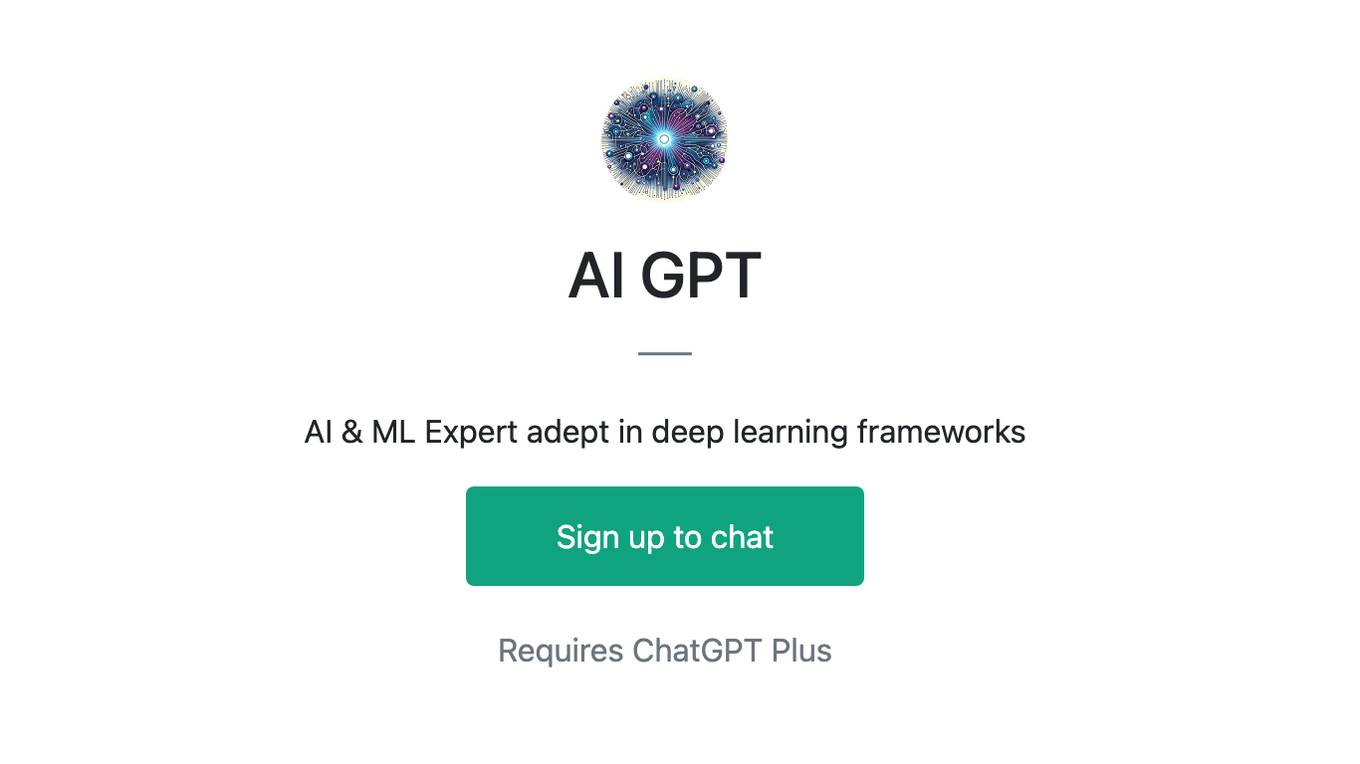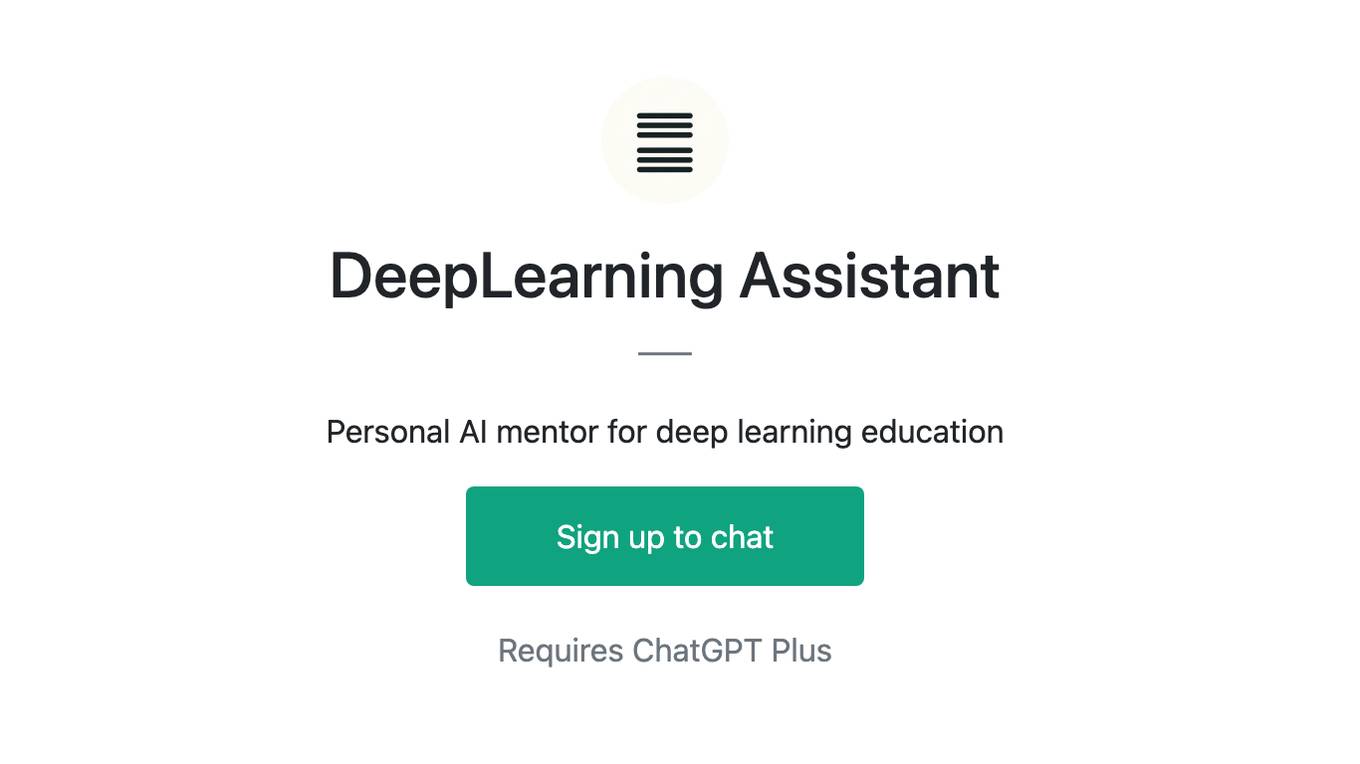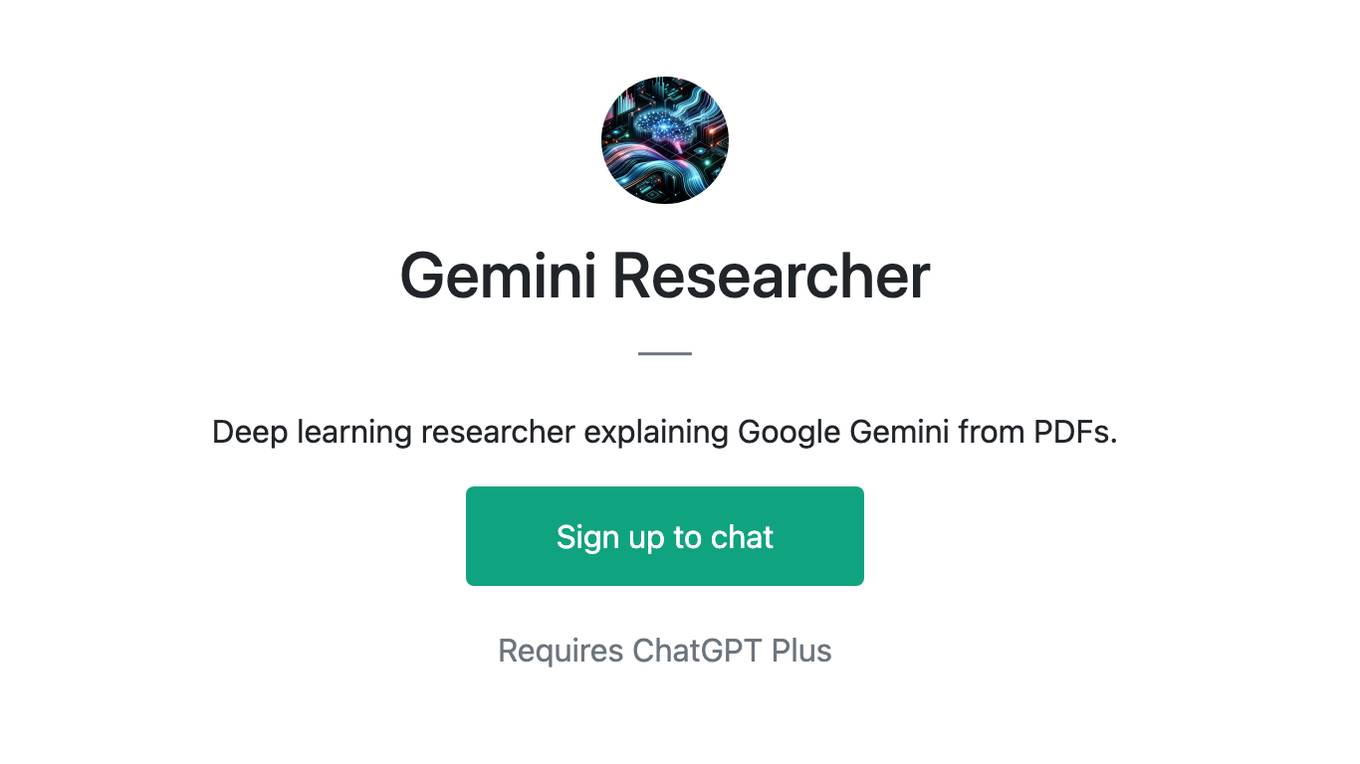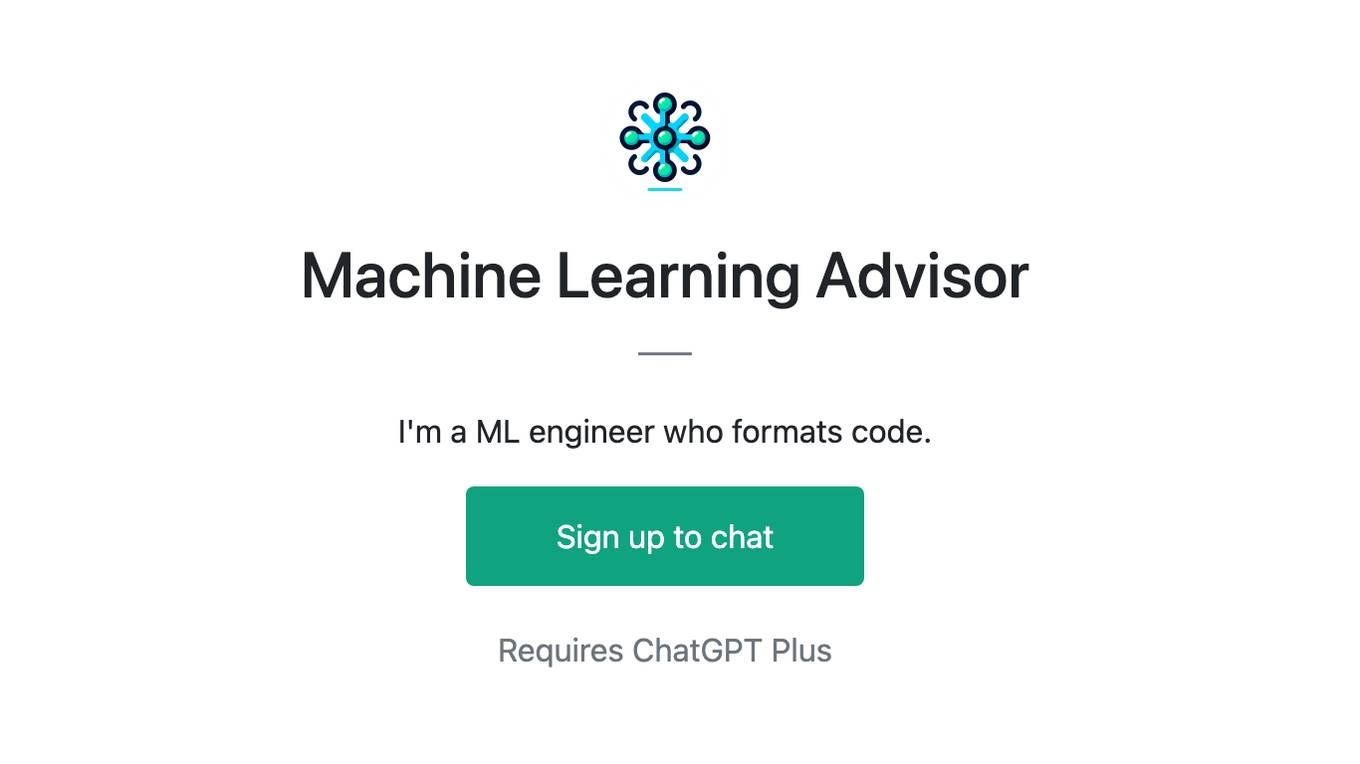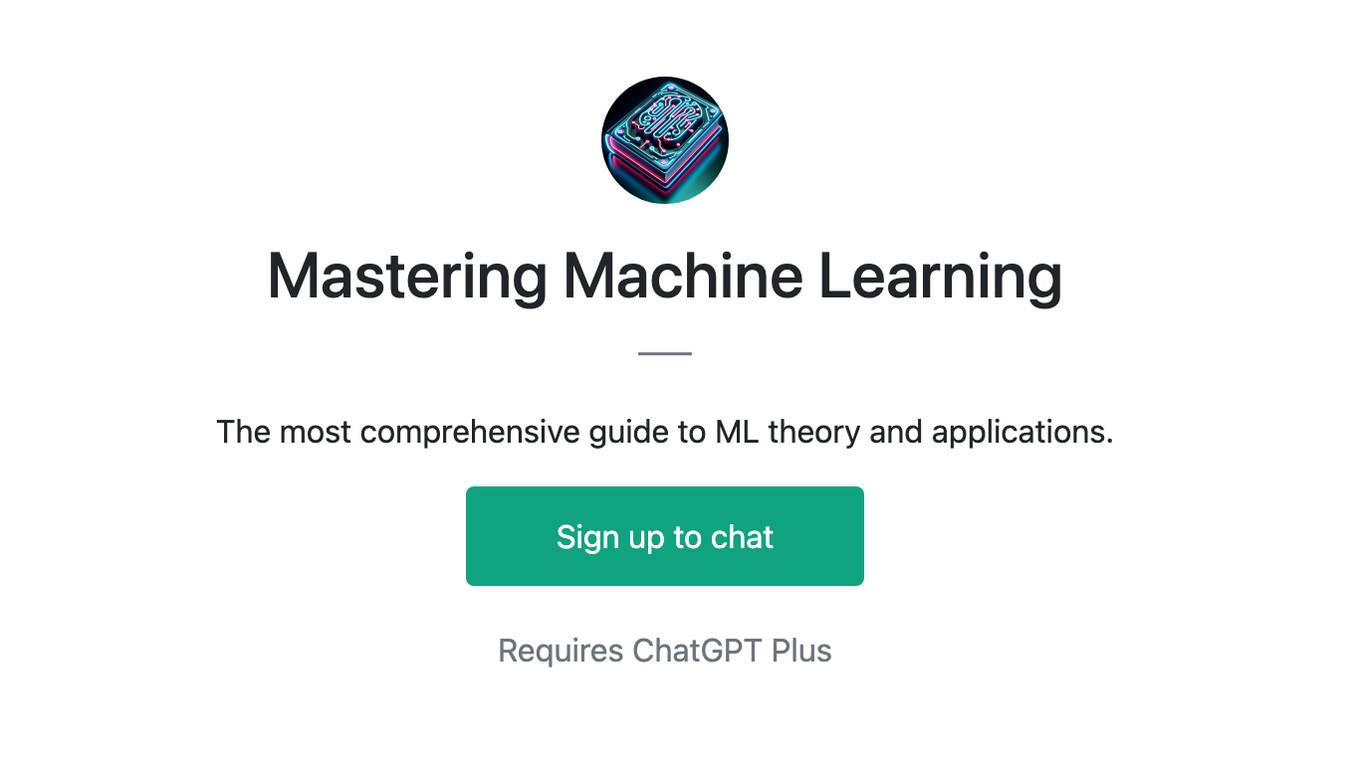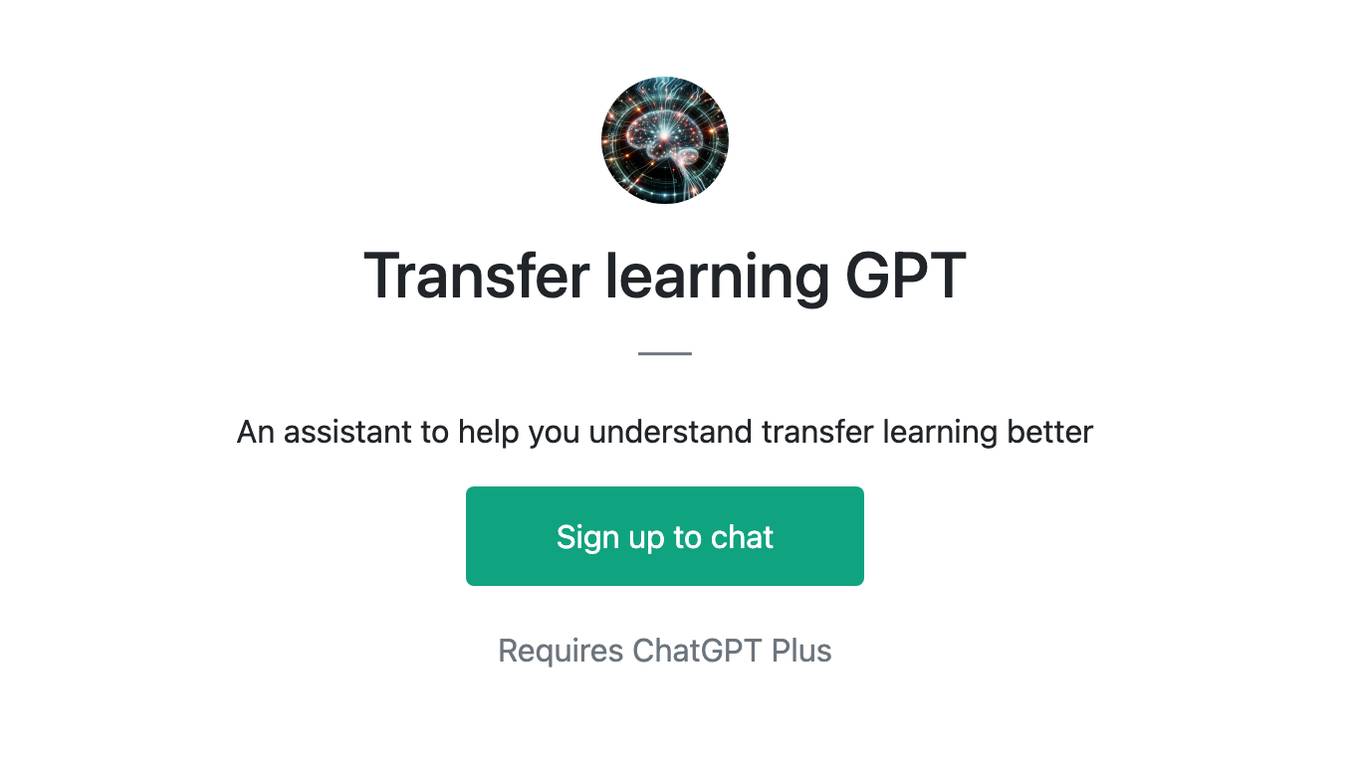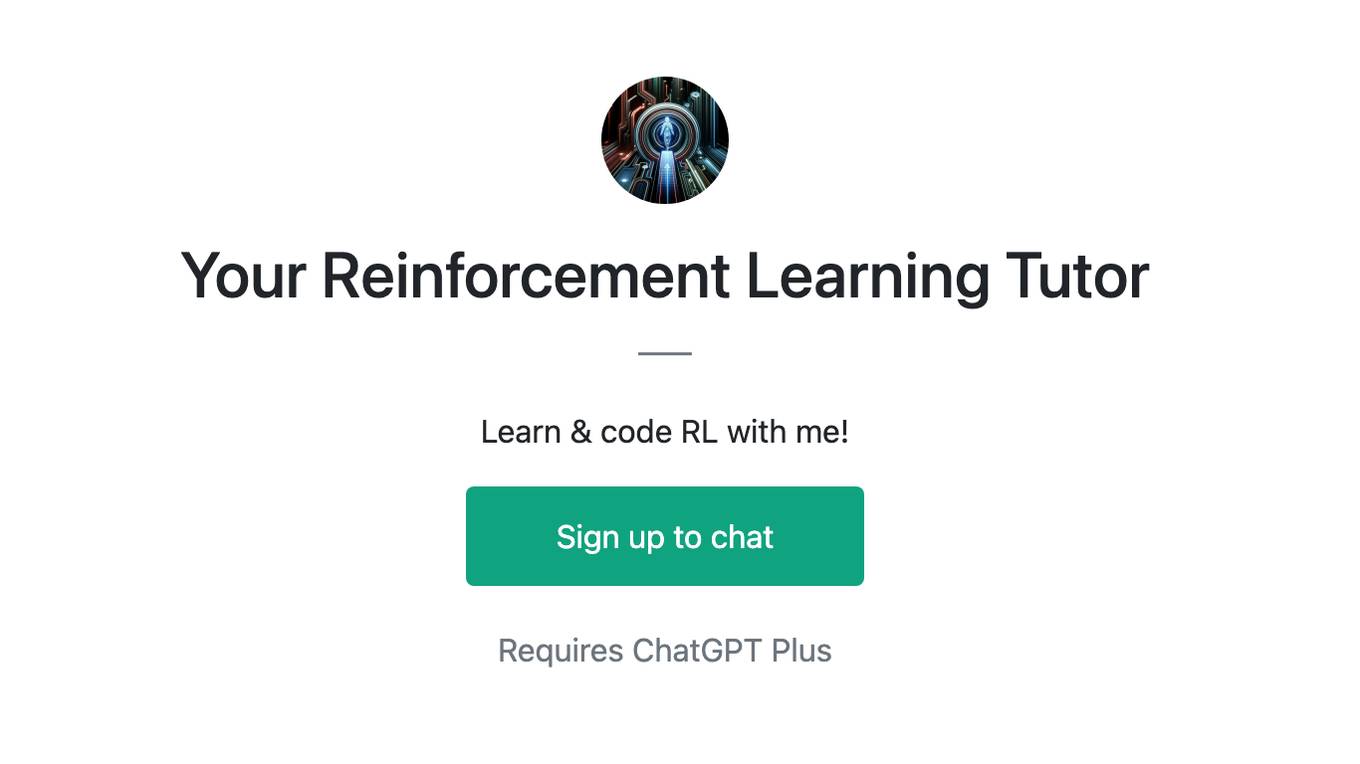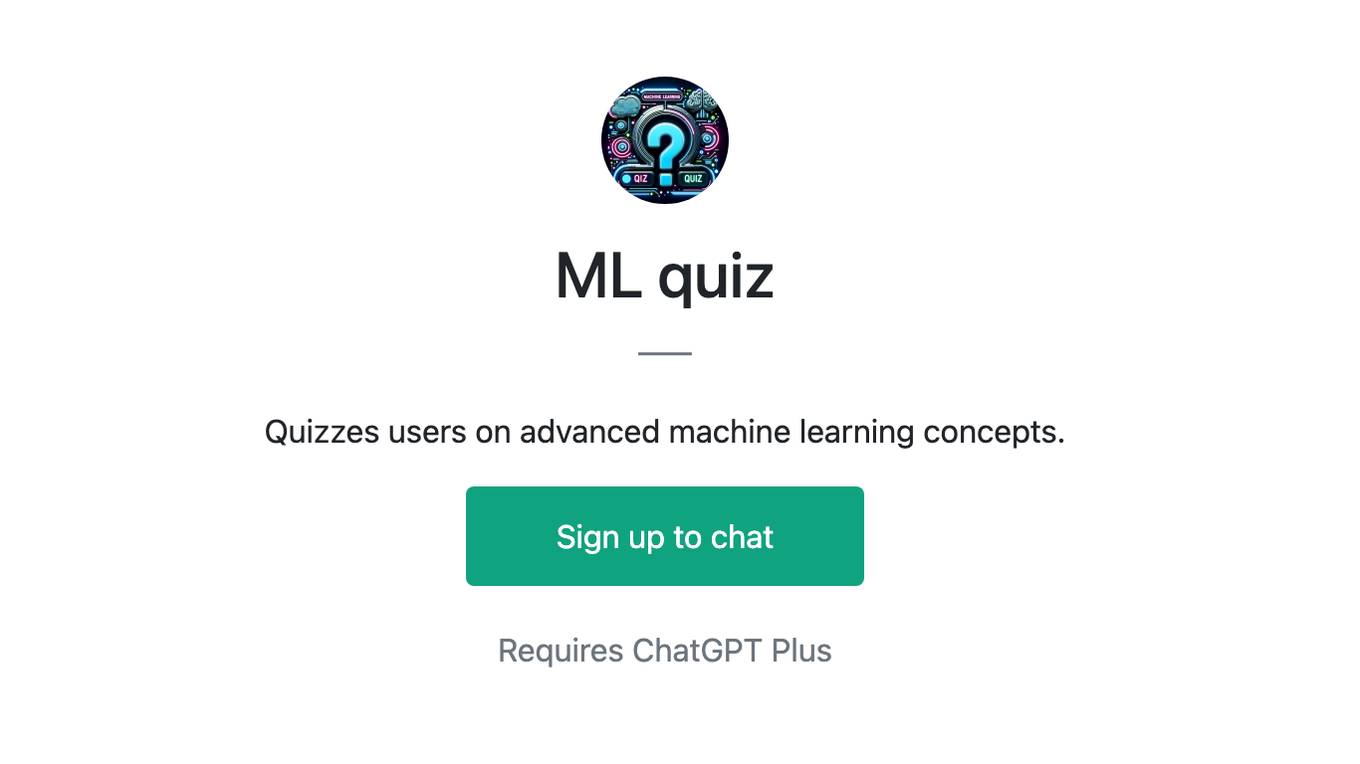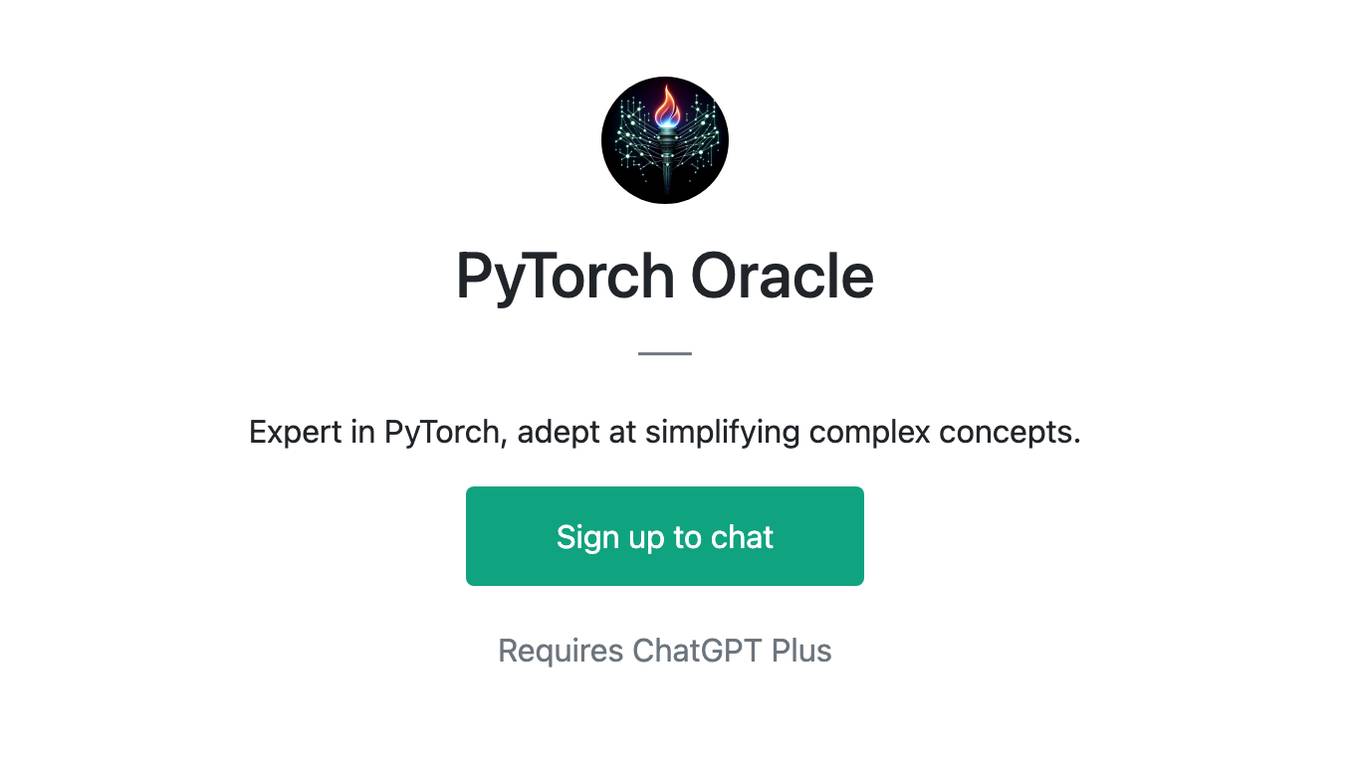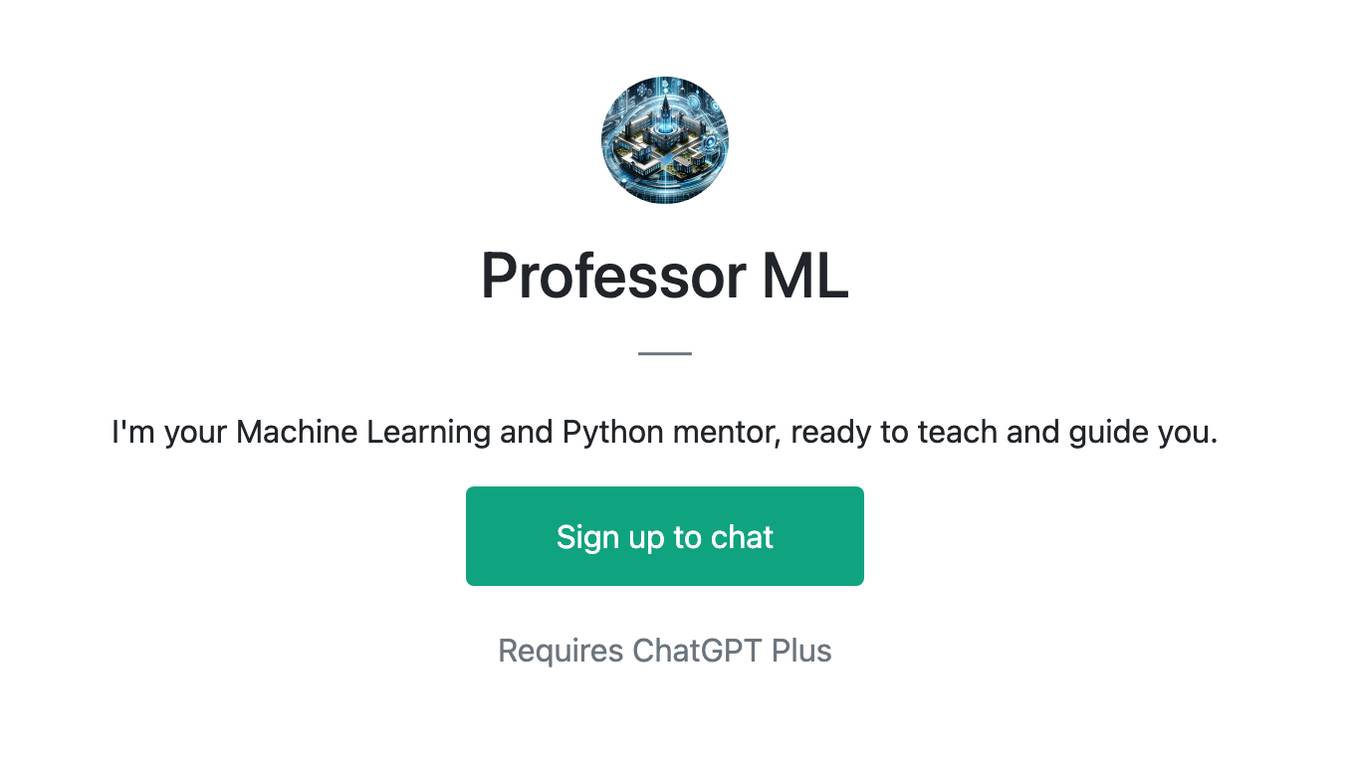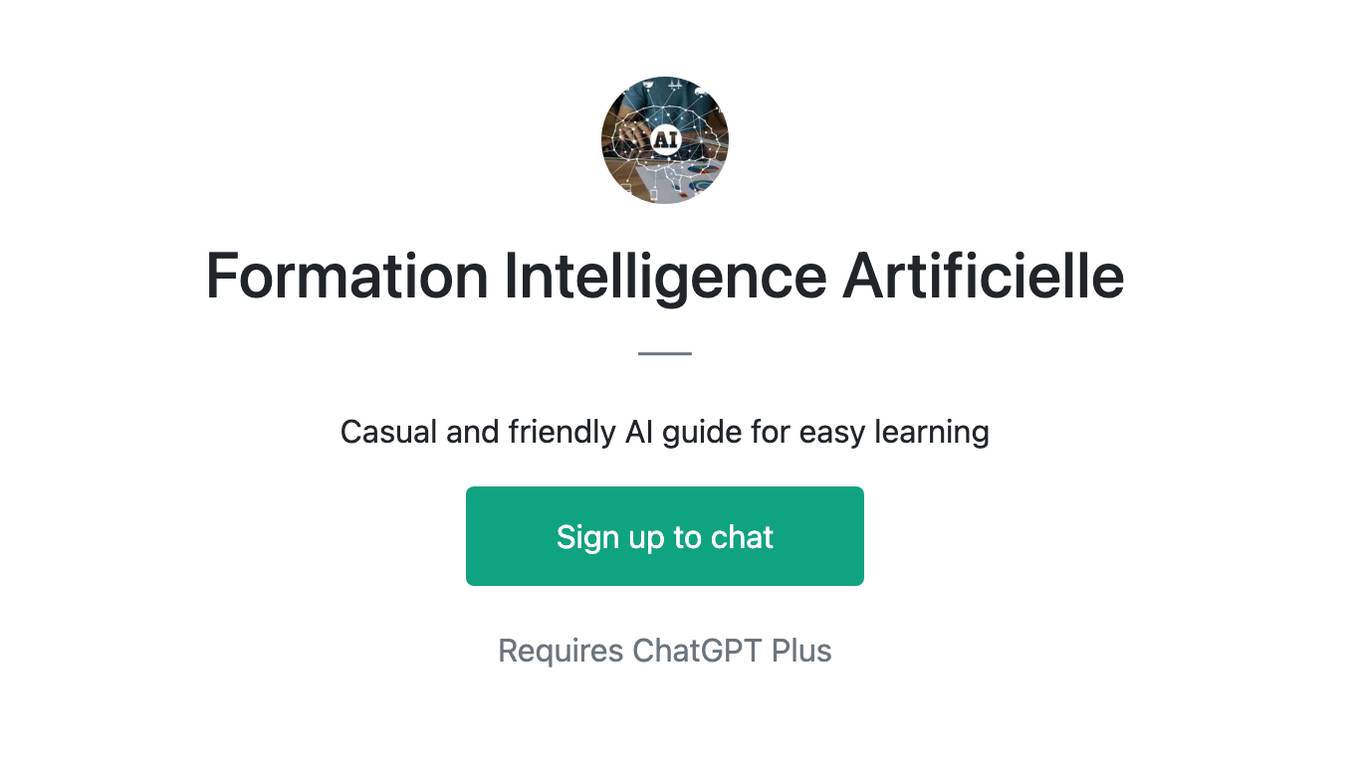Best AI tools for< Deep Learning Engineer >
Infographic
20 - AI tool Sites

Deep Learning
The Deep Learning textbook is a resource intended to help students and practitioners enter the field of machine learning in general and deep learning in particular. The online version of the book is now complete and will remain available online for free. The deep learning textbook can now be ordered on Amazon. For up to date announcements, join our mailing list.
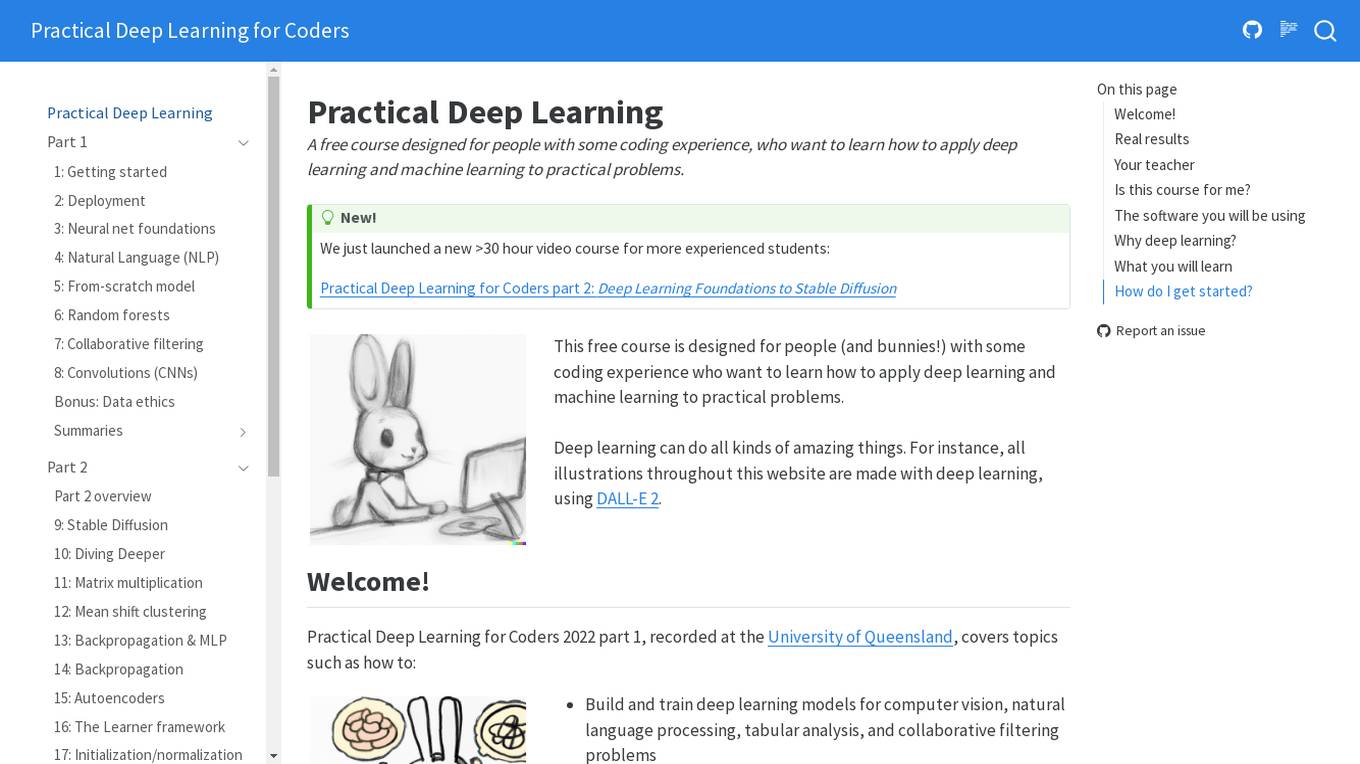
Practical Deep Learning for Coders
Practical Deep Learning for Coders is a free course designed for individuals with some coding experience who want to learn how to apply deep learning and machine learning to practical problems. The course covers topics such as building and training deep learning models for computer vision, natural language processing, tabular analysis, and collaborative filtering problems. It is based on a 5-star rated book and does not require any special hardware or software. The course is led by Jeremy Howard, a renowned expert in machine learning and the President and Chief Scientist of Kaggle.
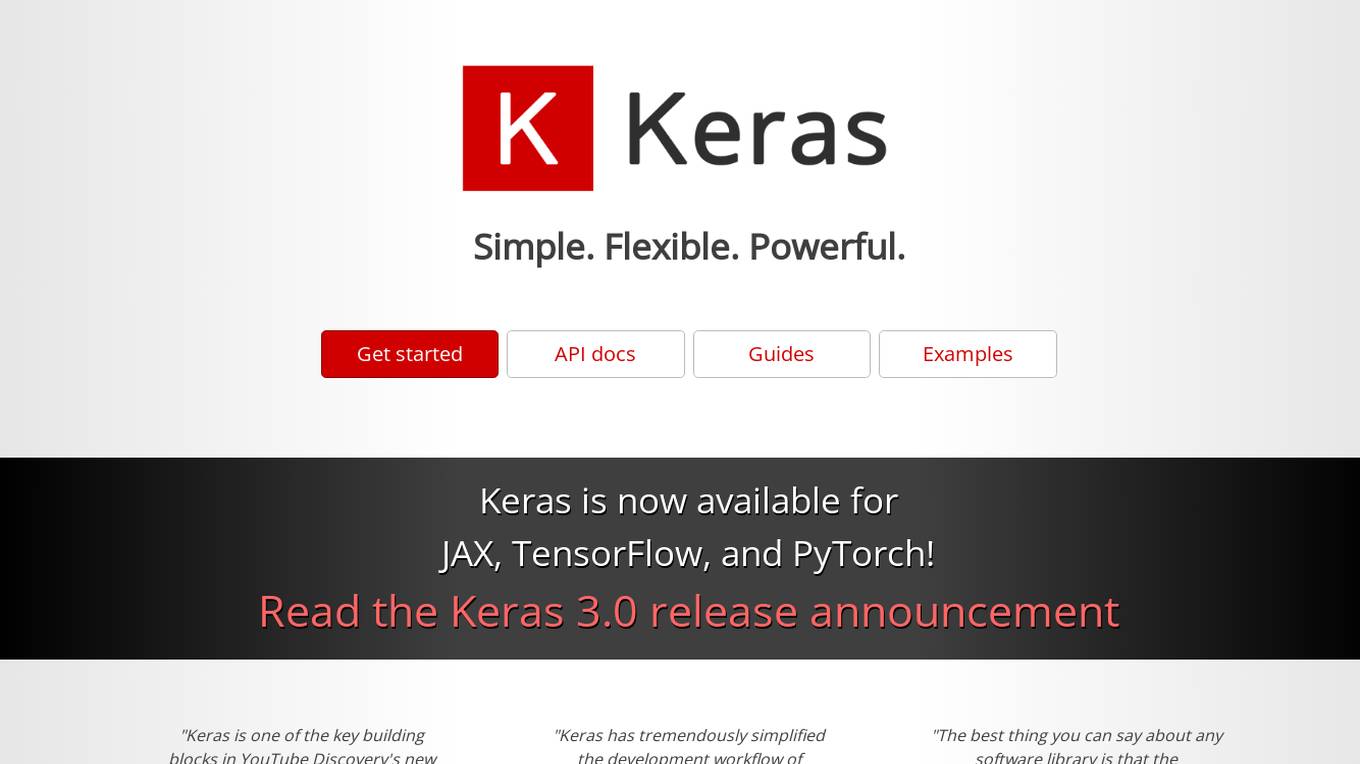
Keras
Keras is an open-source deep learning API written in Python, designed to make building and training deep learning models easier. It provides a user-friendly interface and a wide range of features and tools to help developers create and deploy machine learning applications. Keras is compatible with multiple frameworks, including TensorFlow, Theano, and CNTK, and can be used for a variety of tasks, including image classification, natural language processing, and time series analysis.
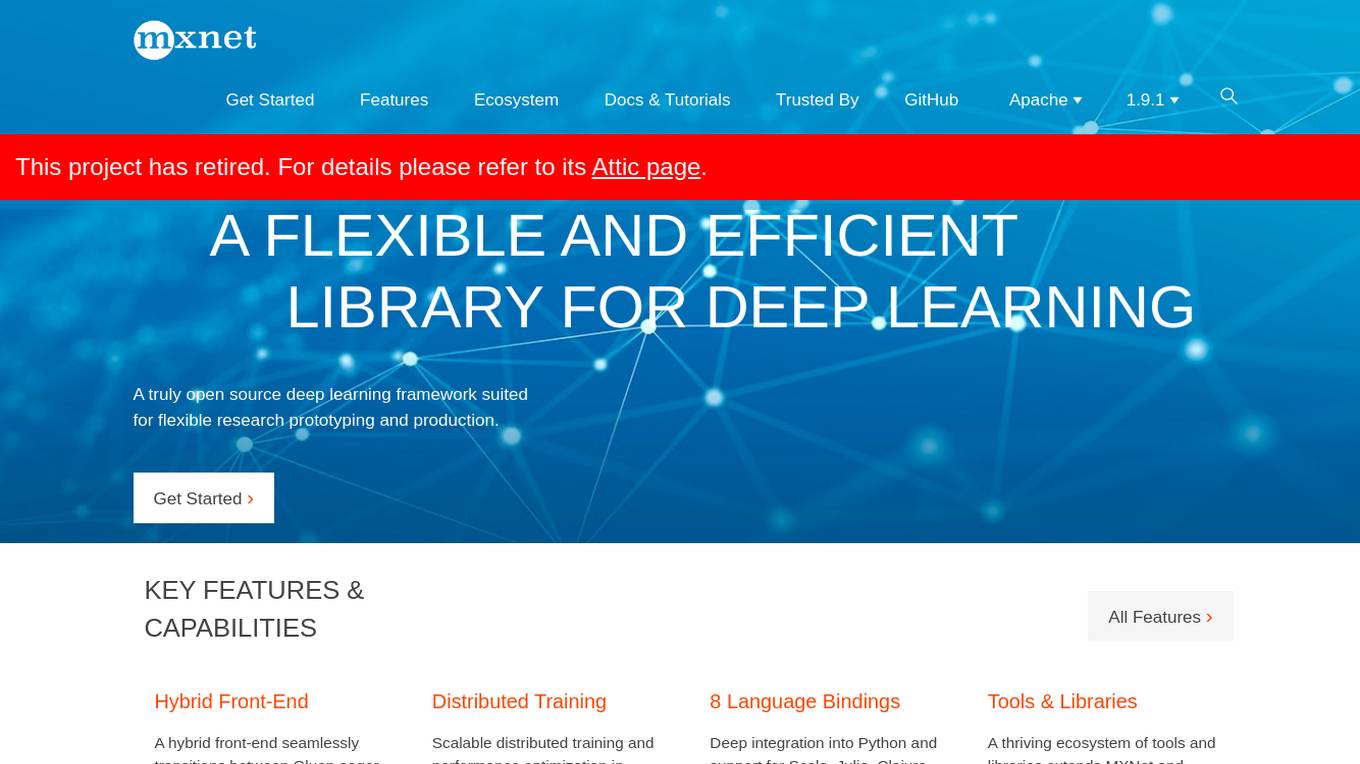
Apache MXNet
Apache MXNet is a flexible and efficient deep learning library designed for research, prototyping, and production. It features a hybrid front-end that seamlessly transitions between imperative and symbolic modes, enabling both flexibility and speed. MXNet also supports distributed training and performance optimization through Parameter Server and Horovod. With bindings for multiple languages, including Python, Scala, Julia, Clojure, Java, C++, R, and Perl, MXNet offers wide accessibility. Additionally, it boasts a thriving ecosystem of tools and libraries that extend its capabilities in computer vision, NLP, time series, and more.
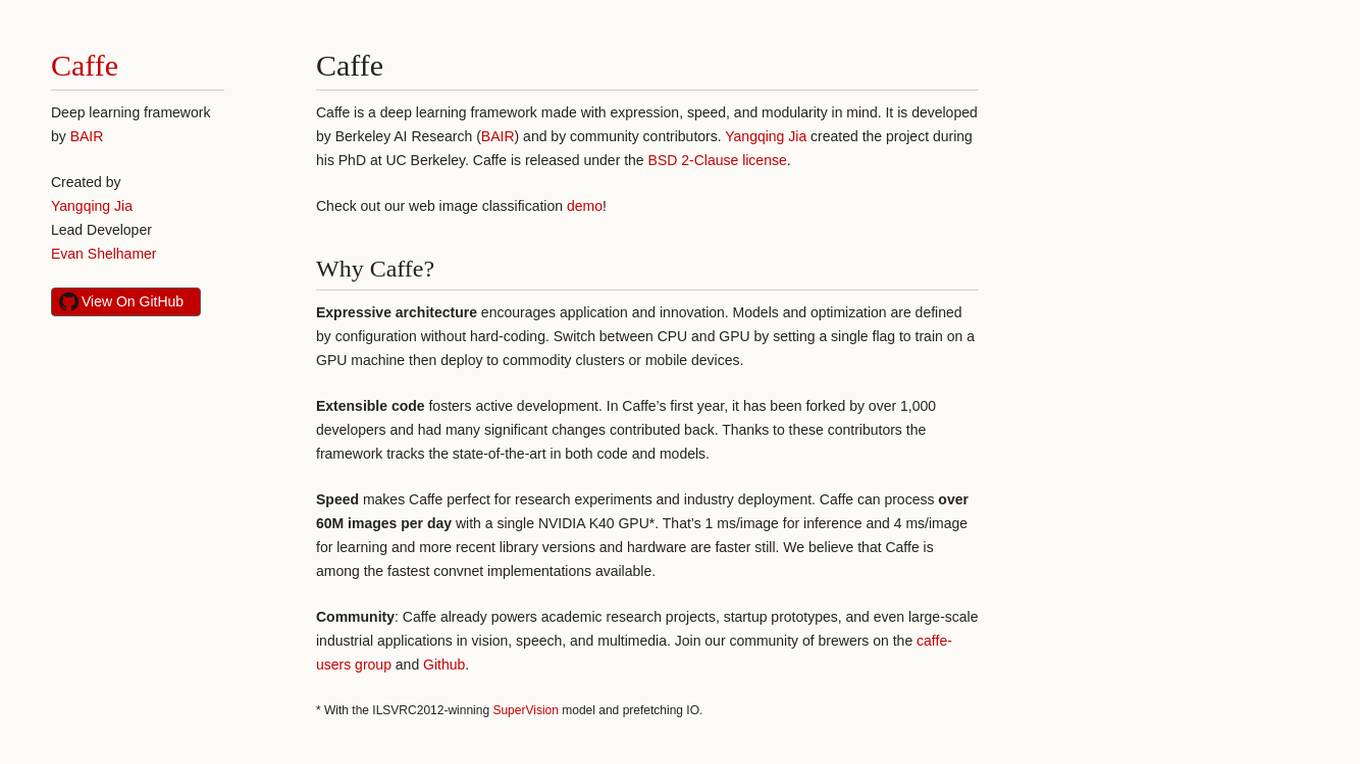
Caffe
Caffe is a deep learning framework developed by Berkeley AI Research (BAIR) and community contributors. It is designed for speed, modularity, and expressiveness, allowing users to define models and optimization through configuration without hard-coding. Caffe supports both CPU and GPU training, making it suitable for research experiments and industry deployment. The framework is extensible, actively developed, and tracks the state-of-the-art in code and models. Caffe is widely used in academic research, startup prototypes, and large-scale industrial applications in vision, speech, and multimedia.
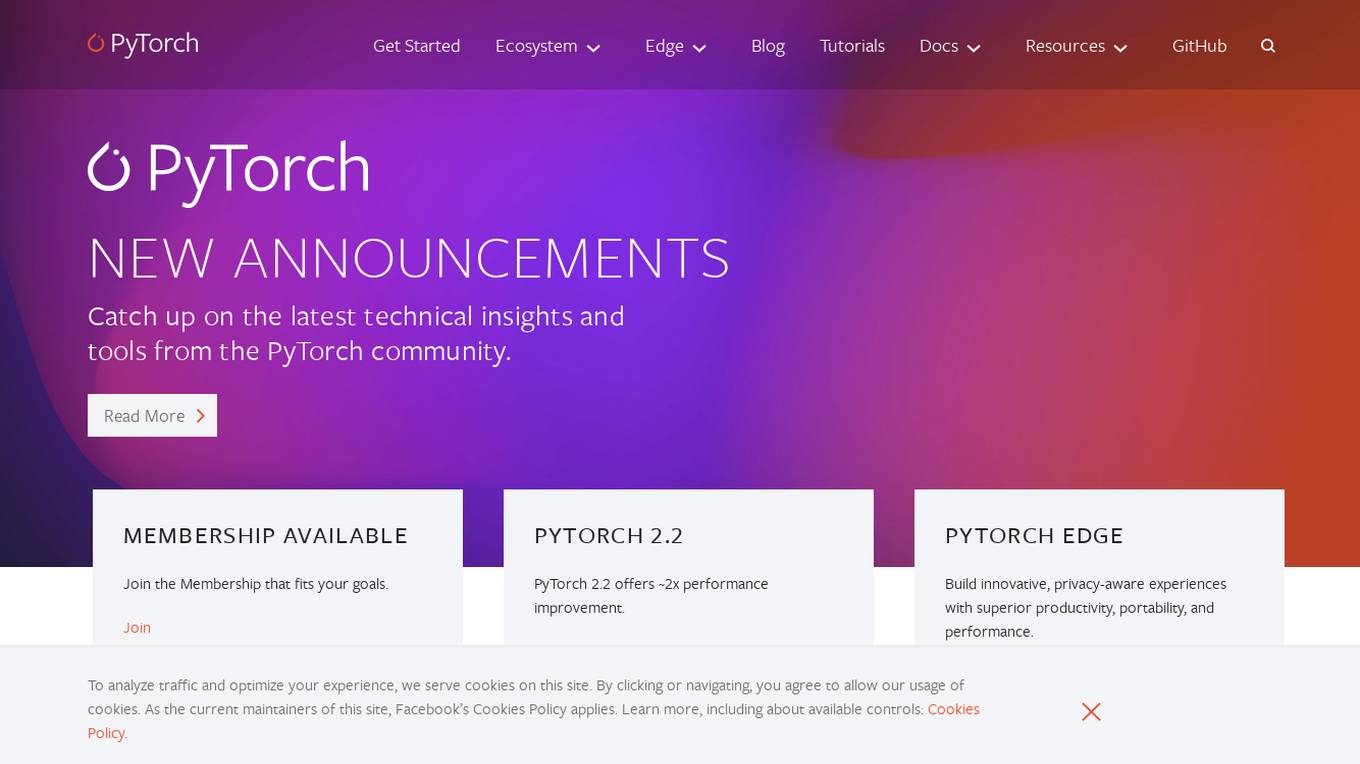
PyTorch
PyTorch is an open-source machine learning library based on the Torch library. It is used for applications such as computer vision, natural language processing, and reinforcement learning. PyTorch is known for its flexibility and ease of use, making it a popular choice for researchers and developers in the field of artificial intelligence.
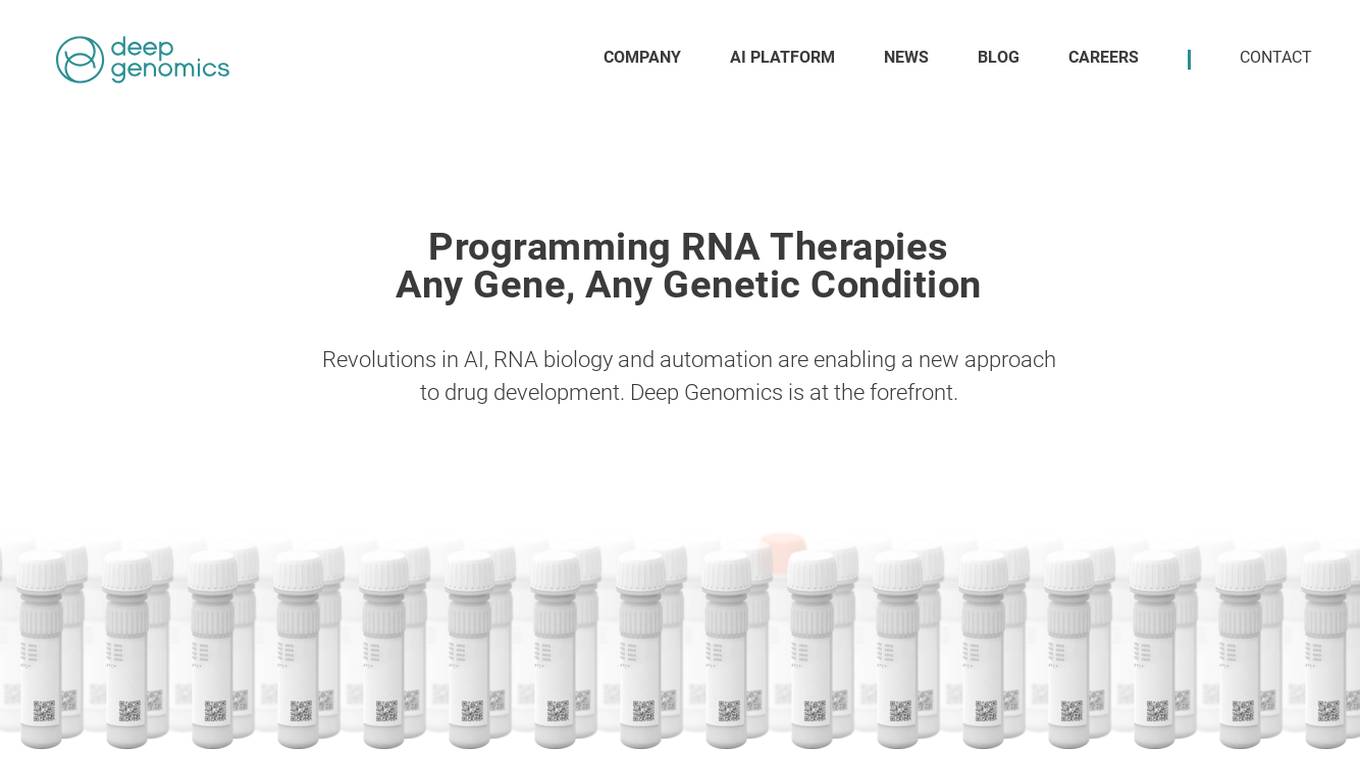
Deep Genomics
Deep Genomics is a company that uses artificial intelligence (AI) to develop RNA therapies for genetic diseases. The company's AI platform is designed to identify novel targets and evaluate thousands of possibilities to identify the best therapeutic candidates. Deep Genomics is currently developing BigRNA+, which will expand the number of mechanisms and genetic variants the company can pursue.
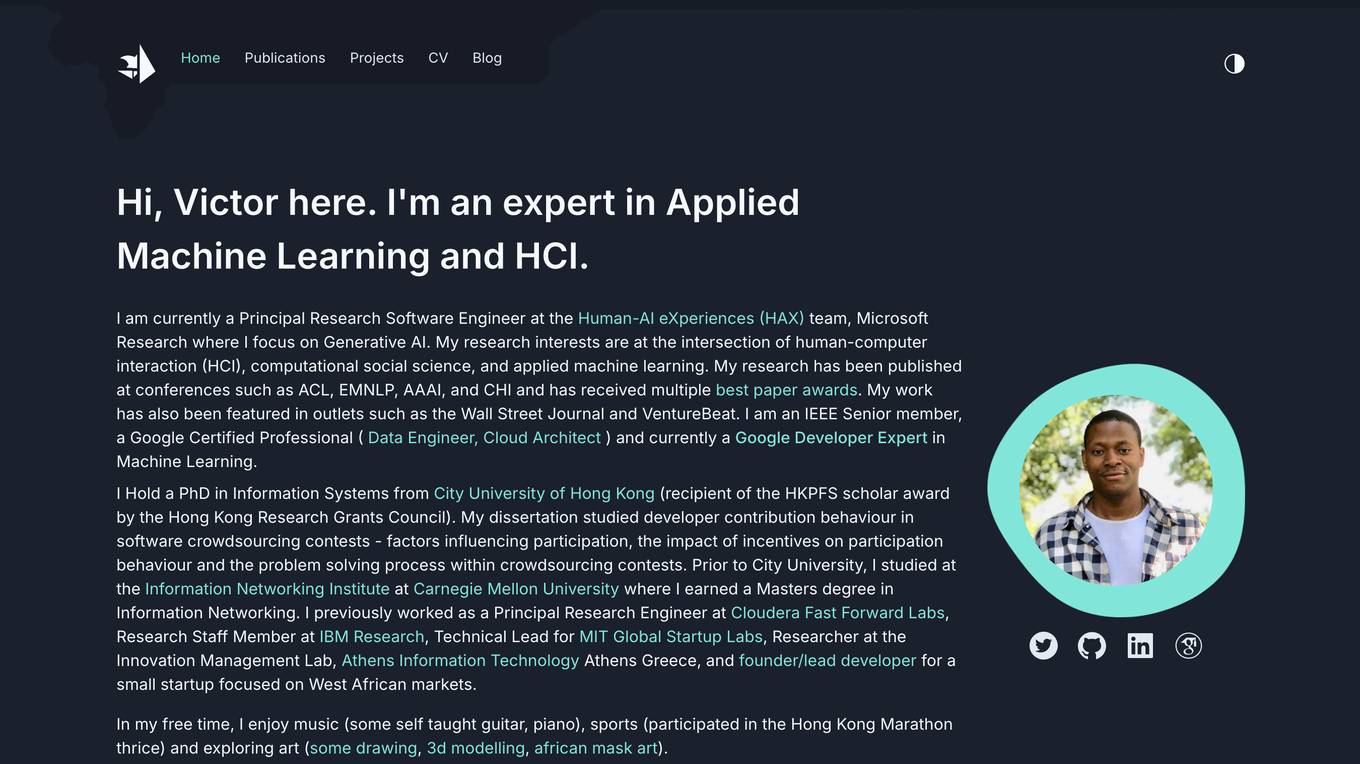
Victor Dibia's Website
Victor Dibia's website showcases his expertise in Applied Machine Learning and Human-Computer Interaction (HCI). He is a Principal Research Software Engineer at Microsoft Research, focusing on Generative AI. The site features his publications, projects, CV, and blog posts, covering topics such as multi-agent systems, recommender systems, and more. Victor's work has been recognized in conferences and media outlets, highlighting his contributions to the field of AI and HCI.
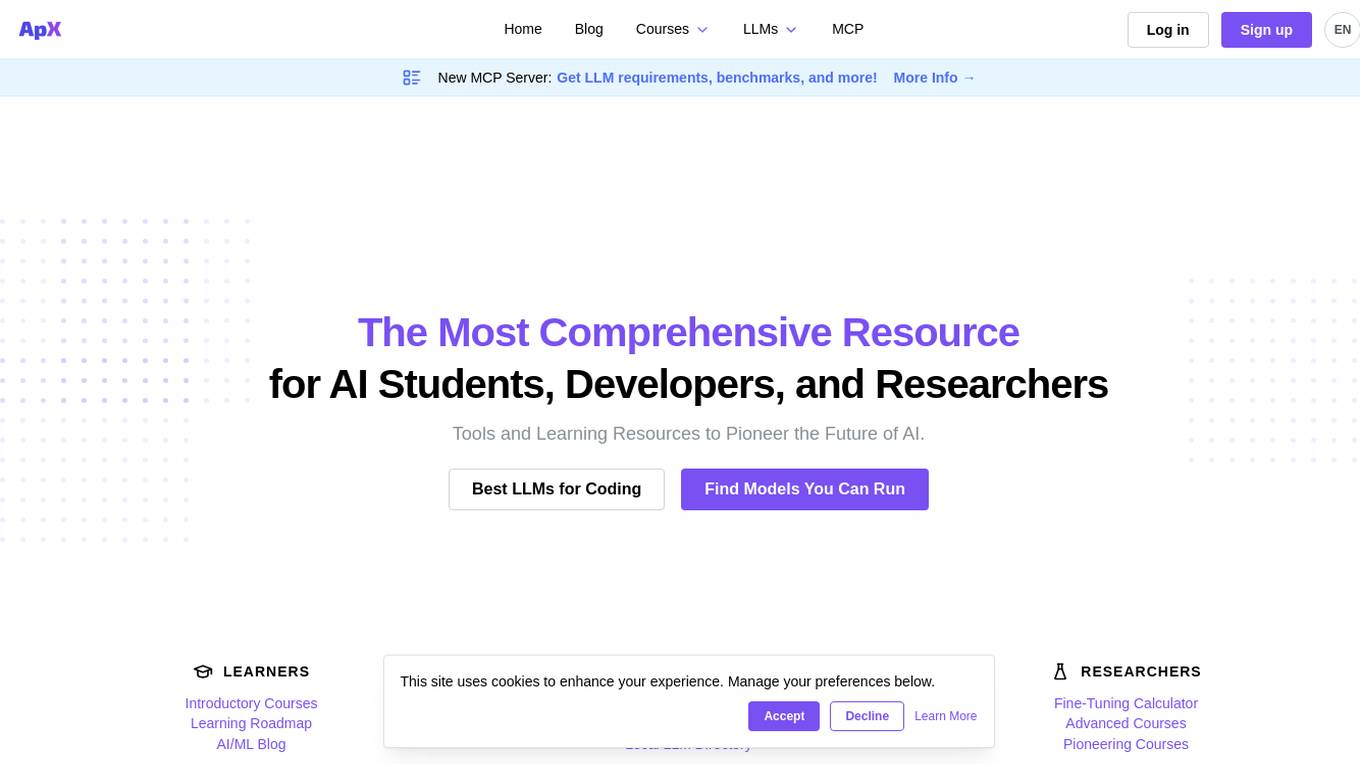
ApX Machine Learning
ApX Machine Learning is a comprehensive resource for AI students, developers, and researchers, offering tools and learning resources to pioneer the future of AI. It provides a wide range of courses, tools, and benchmarks for learners, developers, and researchers in the field of machine learning and artificial intelligence. The platform aims to enhance the capabilities of existing large language models (LLMs) through the Model Context Protocol (MCP), providing access to resources, benchmarks, and tools to improve LLM performance and efficiency.
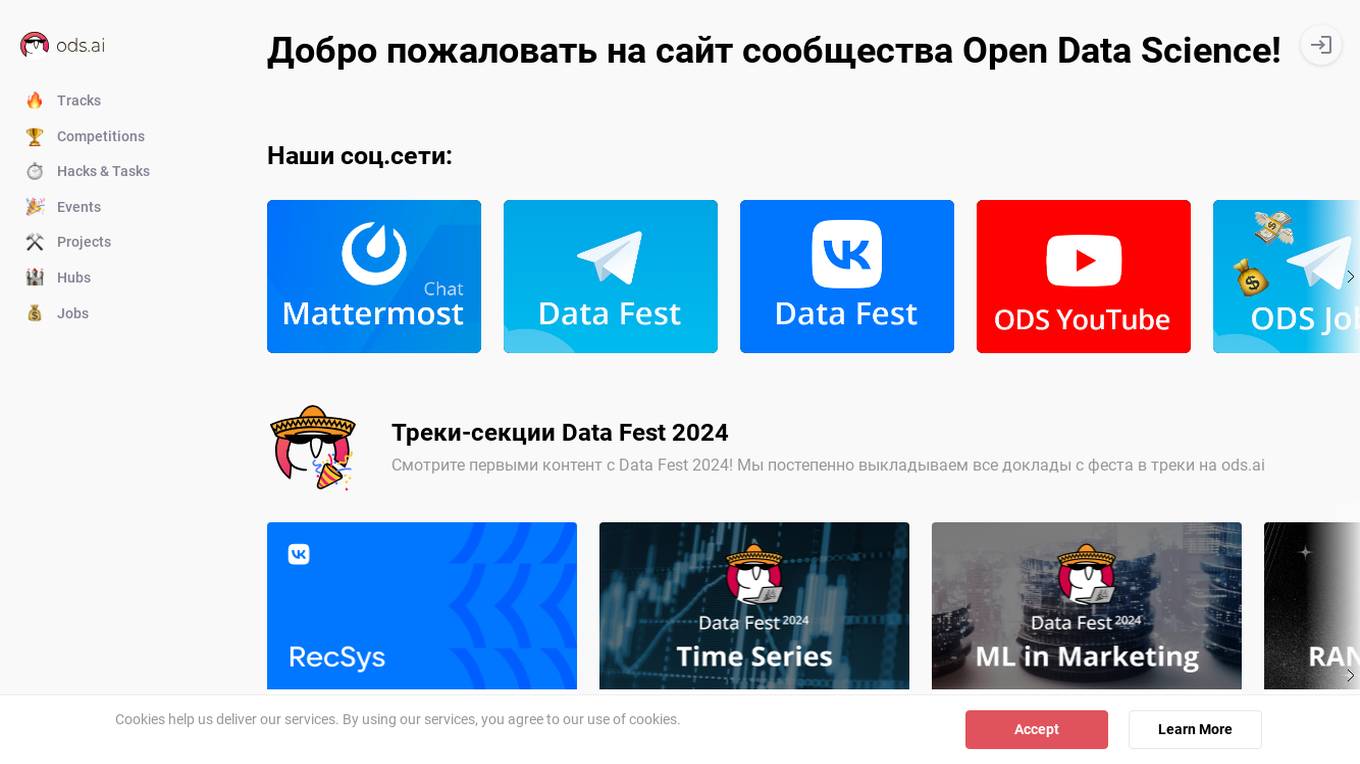
Open Data Science
Open Data Science (ODS) is a community website offering a platform for data science enthusiasts to engage in tracks, competitions, hacks, tasks, events, and projects. The website serves as a hub for job opportunities and provides a space for privacy policy, service agreements, and public offers. ODS.AI, established in 2015, focuses on various data science topics such as machine learning, computer vision, natural language processing, and more. The platform hosts online and offline events, conferences, and educational courses to foster learning and networking within the data science community.
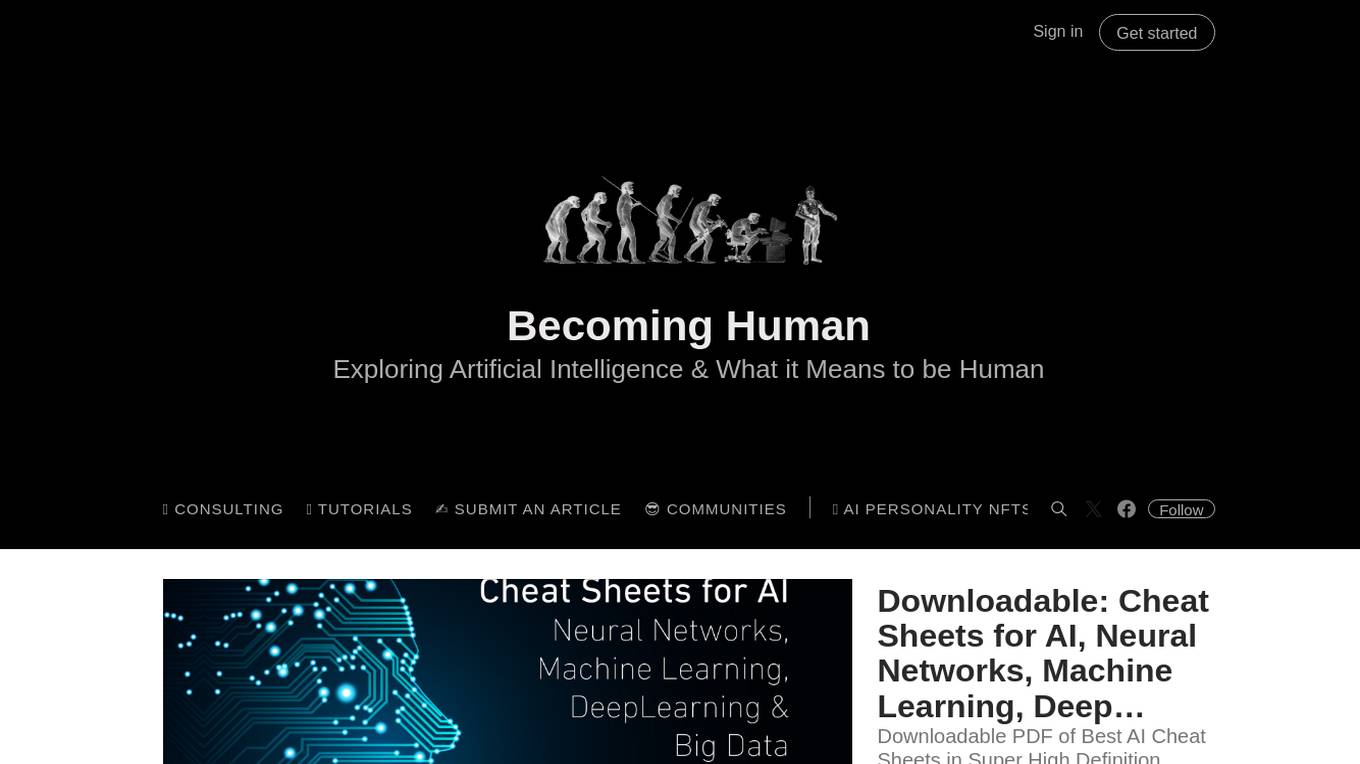
Becoming Human: Artificial Intelligence Magazine
Becoming Human is an Artificial Intelligence Magazine that explores the realm of artificial intelligence and its impact on humanity. The platform offers a wide range of content, including consulting services, tutorials, article submissions, and community engagement. Users can access downloadable cheat sheets for AI, neural networks, machine learning, deep learning, and data science. The magazine covers topics such as AI transformation, quality inspection in automotive, consciousness types, data mining, chatbots, and more.

Myple
Myple is an AI application that enables users to build, scale, and secure AI applications with ease. It provides production-ready AI solutions tailored to individual needs, offering a seamless user experience. With support for multiple languages and frameworks, Myple simplifies the integration of AI through open-source SDKs. The platform features a clean interface, keyboard shortcuts for efficient navigation, and templates to kickstart AI projects. Additionally, Myple offers AI-powered tools like RAG chatbot for documentation, Gmail agent for email notifications, and AskFeynman for physics-related queries. Users can connect their favorite tools and services effortlessly, without any coding. Joining the beta program grants early access to new features and issue resolution prioritization.
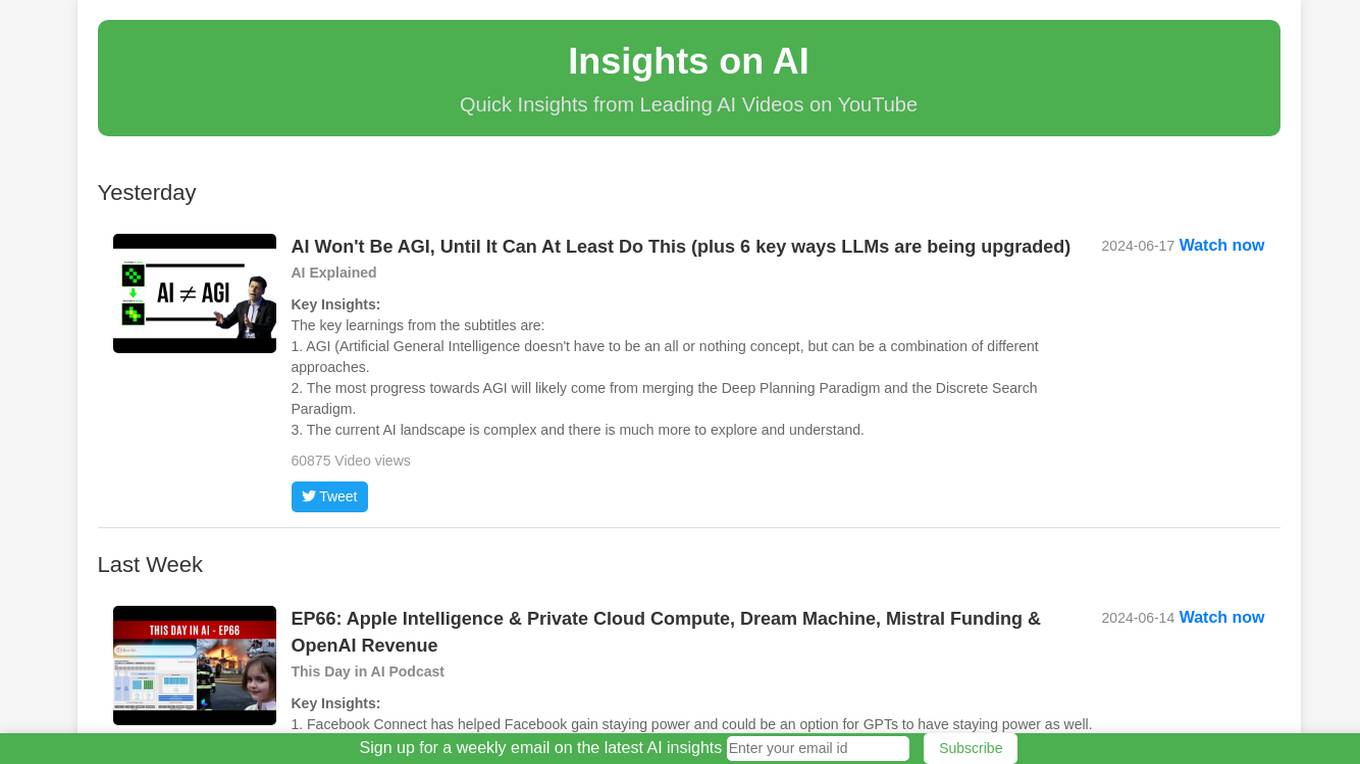
AI Insights
The AI Insights website provides quick insights and summaries from leading AI videos on YouTube. It covers a wide range of topics related to artificial intelligence, including key learnings, advancements, and future trends in the AI landscape. Users can stay updated on the latest developments in AI through video summaries and podcasts, gaining valuable knowledge and understanding of complex AI concepts.
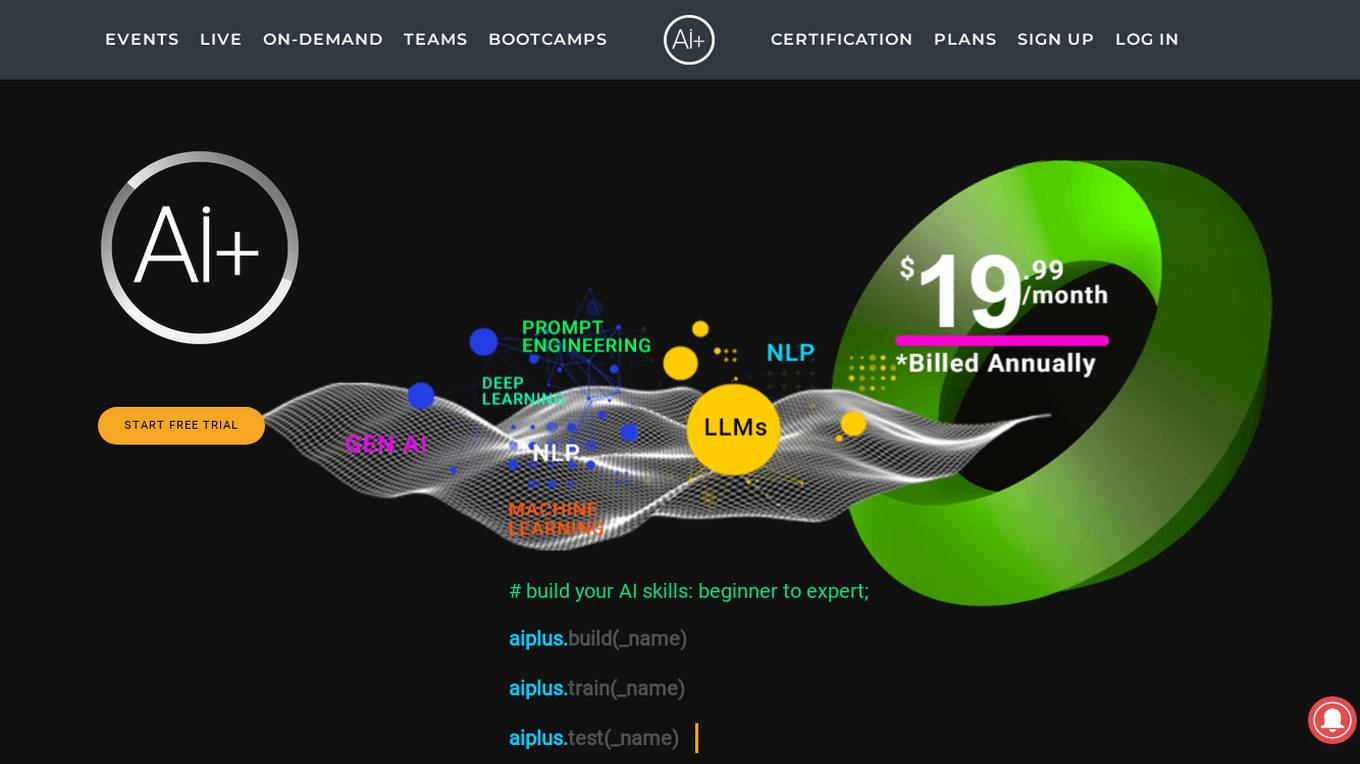
AI+ Training & Conferences
The website is a platform offering AI training and conferences for data science practitioners. It provides live and on-demand events, bootcamps, certifications, and courses covering various AI topics such as deep learning, machine learning, and generative AI. Users can access expert-led training sessions, workshops, and hands-on projects to enhance their AI skills and knowledge. The platform aims to unlock potential opportunities for learning, networking, and professional growth in the field of AI and data science.
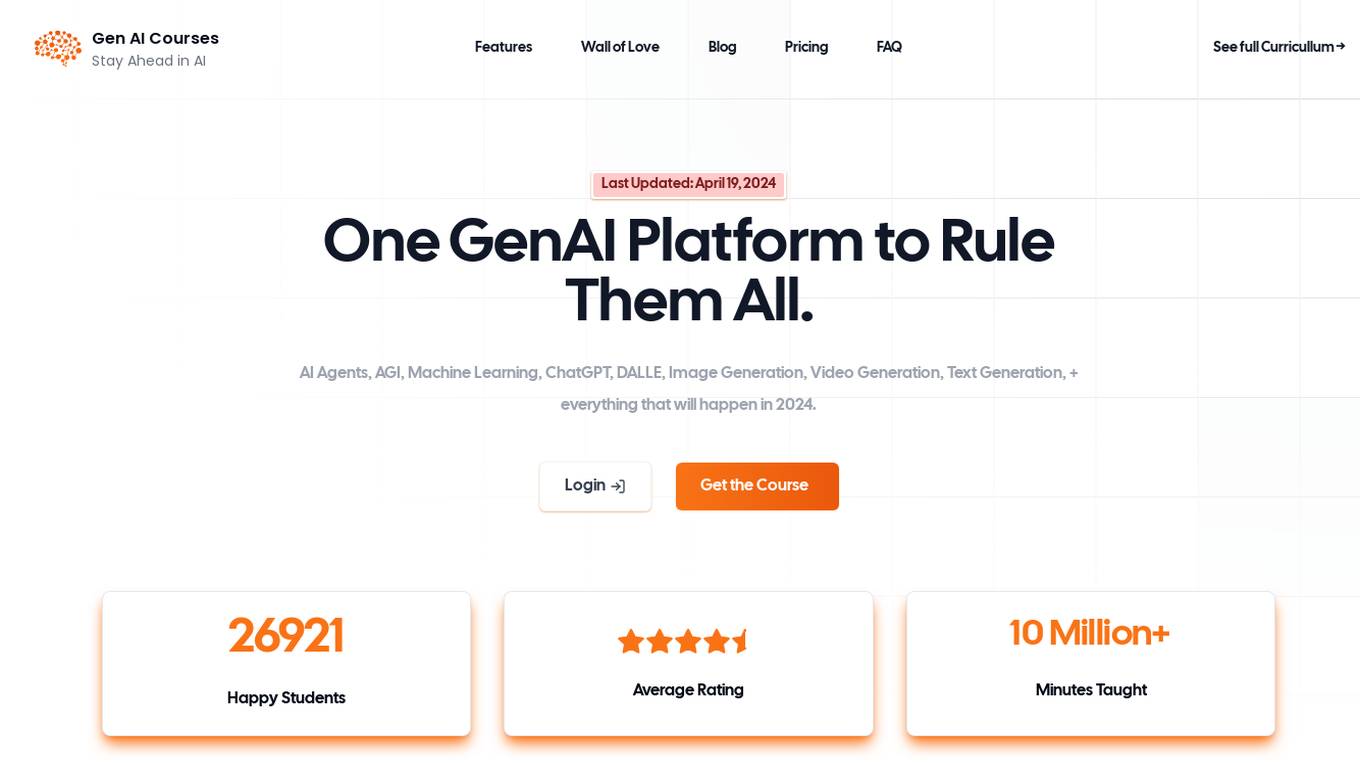
Generative AI Courses
This website offers courses on generative AI, including GenAI, AI, machine learning, deep learning, chatGPT, DALLE, image generation, video generation, text generation, and other topics that are expected to be relevant in 2024.
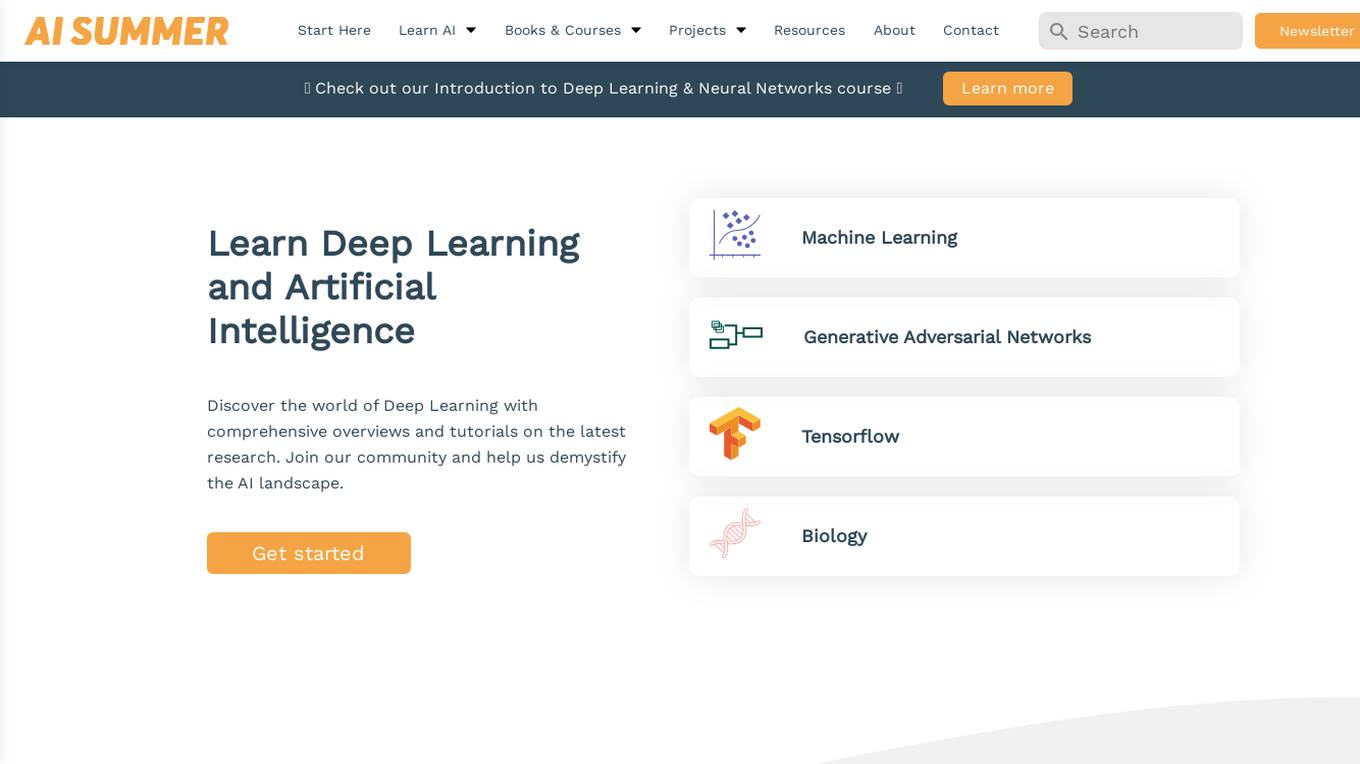
AI Summer
AI Summer is a free educational platform that covers research and applied trends in AI and Deep Learning. It provides accessible and comprehensive content from the entire spectrum of AI to bridge the gap between researchers and the public. The platform simplifies complex concepts and drives scientific research by offering highly-detailed overviews of recent deep learning developments and thorough tutorials on popular frameworks. AI Summer is a community that seeks to demystify the AI landscape and enable new technological innovations.
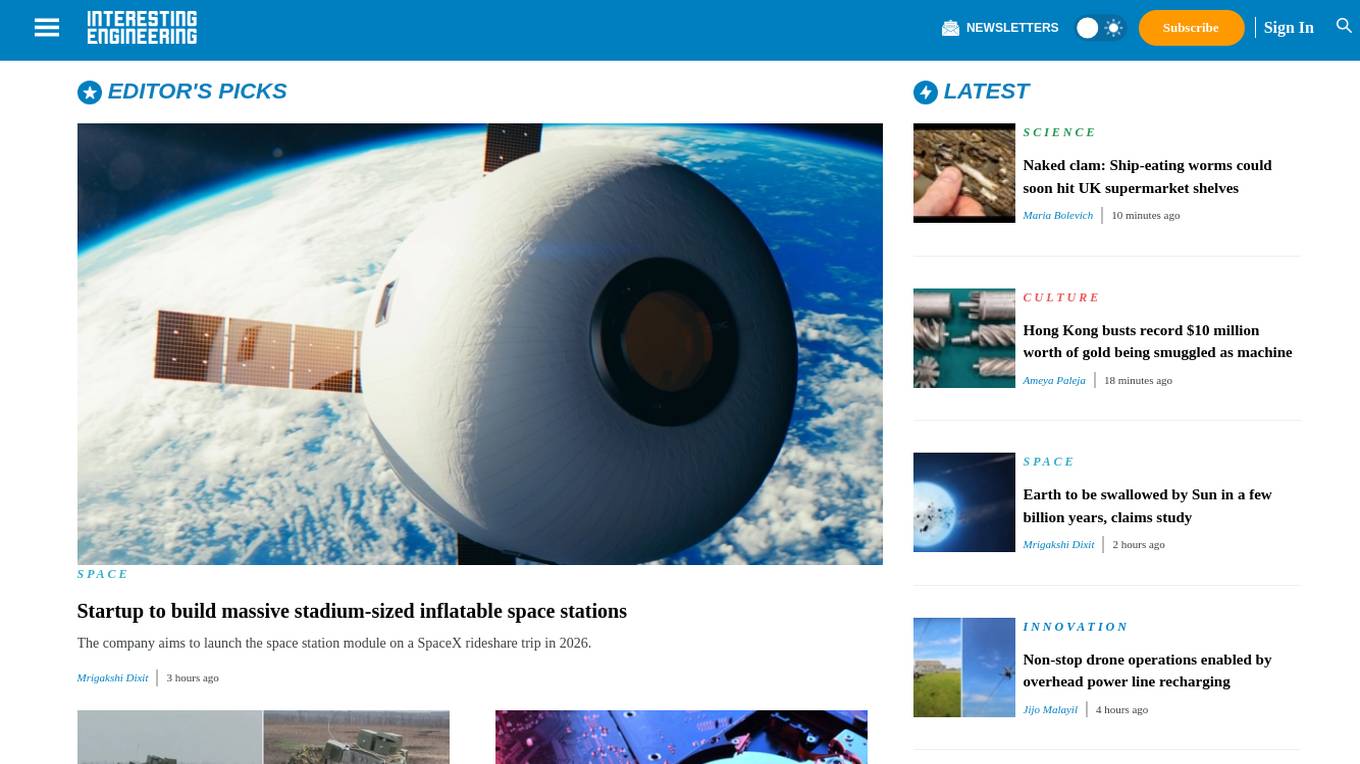
Interesting Engineering
Interesting Engineering is a website that covers the latest news and developments in technology, science, innovation, and engineering. The website features articles, videos, and podcasts on a wide range of topics, including artificial intelligence, robotics, space exploration, and renewable energy. Interesting Engineering also offers a variety of educational resources, such as courses, workshops, and webinars.

Big Vision
Big Vision provides consulting services in AI, computer vision, and deep learning. They help businesses build specific AI-driven solutions, create intelligent processes, and establish best practices to reduce human effort and enable faster decision-making. Their enterprise-grade solutions are currently serving millions of requests every month, especially in critical production environments.
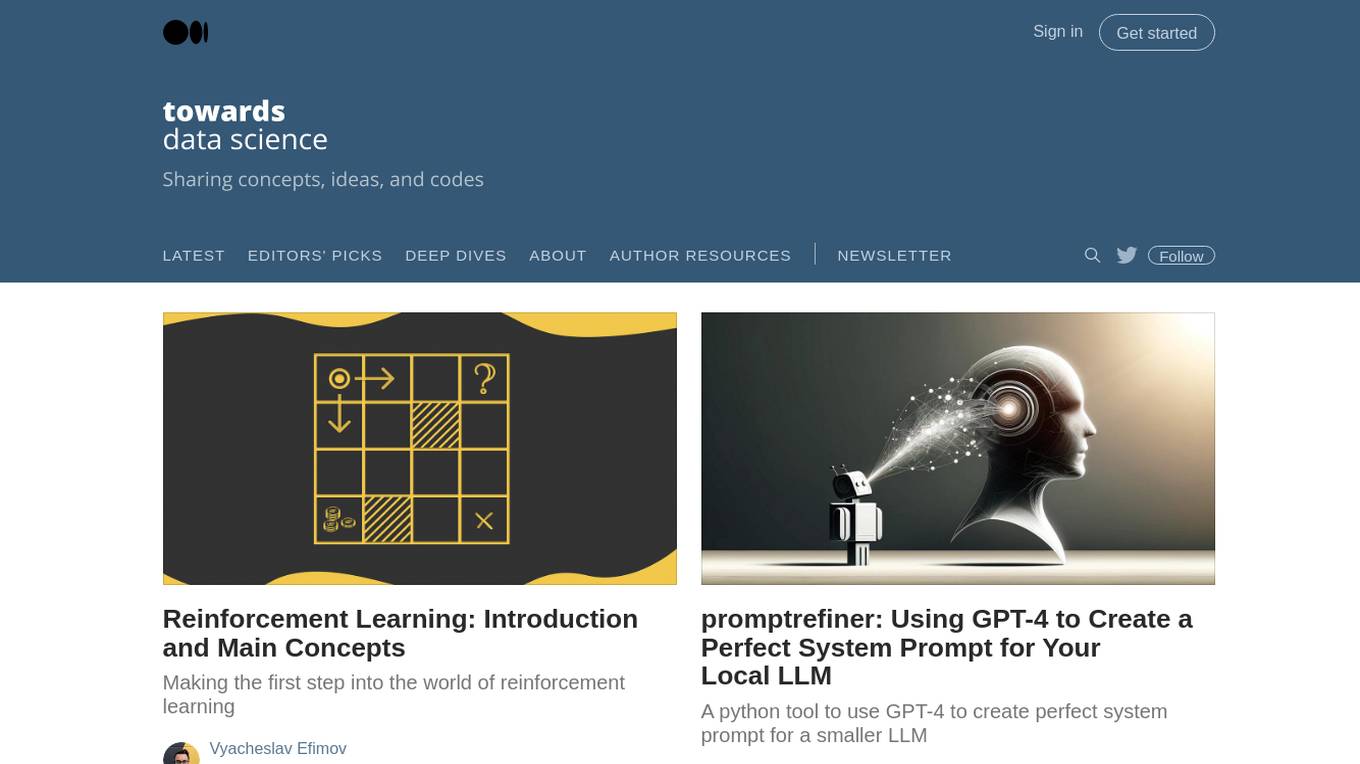
Towards Data Science
Towards Data Science is a Medium publication dedicated to sharing concepts, ideas, and codes in the field of data science. It provides a platform for data scientists, researchers, and practitioners to connect, learn, and contribute to the advancement of the field.
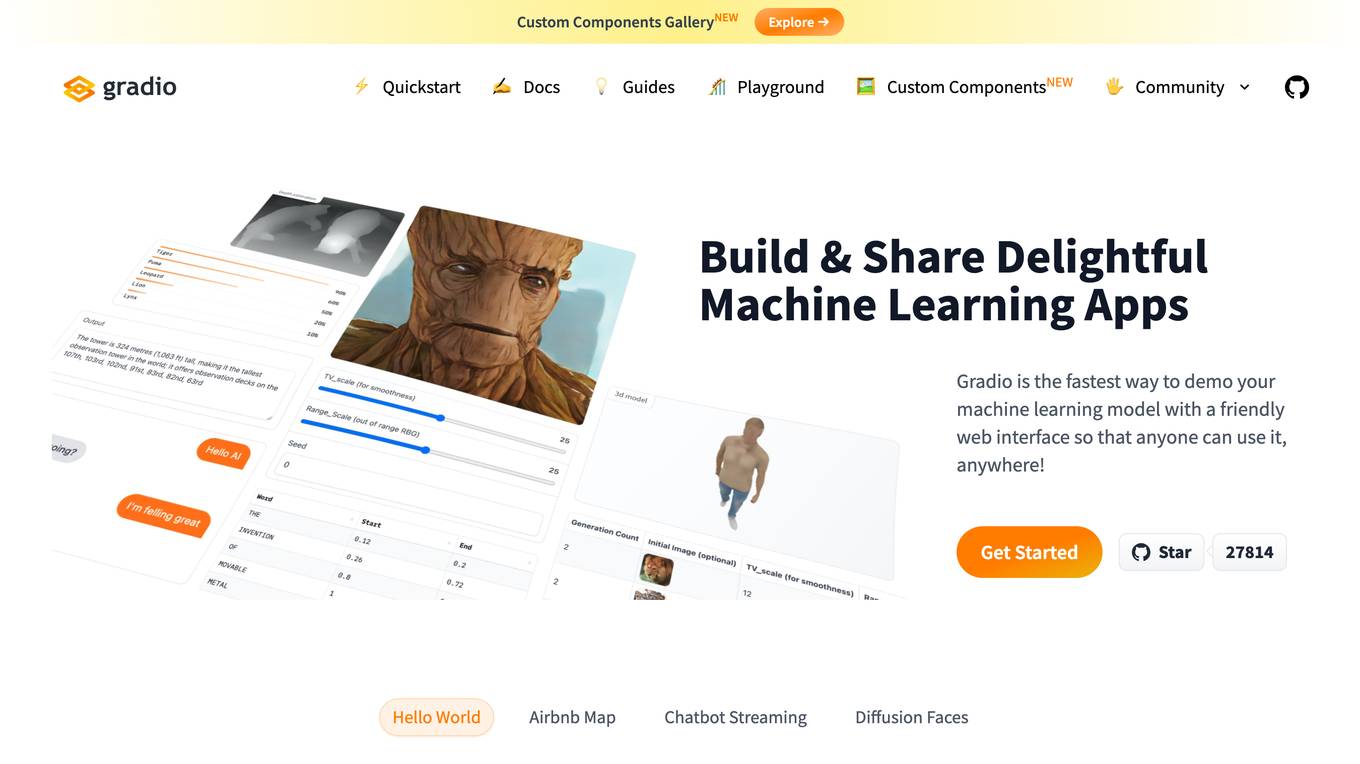
Gradio
Gradio is a tool that allows users to quickly and easily create web-based interfaces for their machine learning models. With Gradio, users can share their models with others, allowing them to interact with and use the models remotely. Gradio is easy to use and can be integrated with any Python library. It can be used to create a variety of different types of interfaces, including those for image classification, natural language processing, and time series analysis.
27 - Open Source Tools
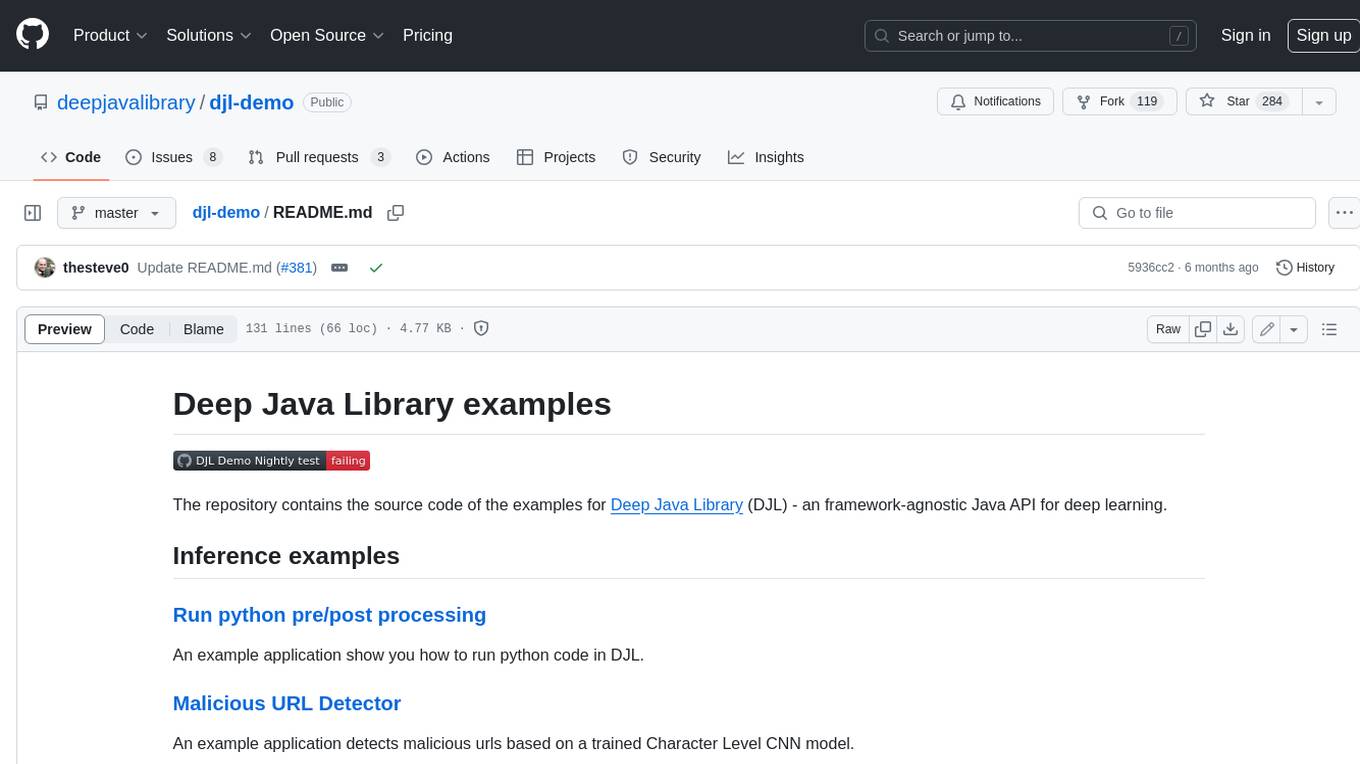
djl-demo
The Deep Java Library (DJL) is a framework-agnostic Java API for deep learning. It provides a unified interface to popular deep learning frameworks such as TensorFlow, PyTorch, and MXNet. DJL makes it easy to develop deep learning applications in Java, and it can be used for a variety of tasks, including image classification, object detection, natural language processing, and speech recognition.
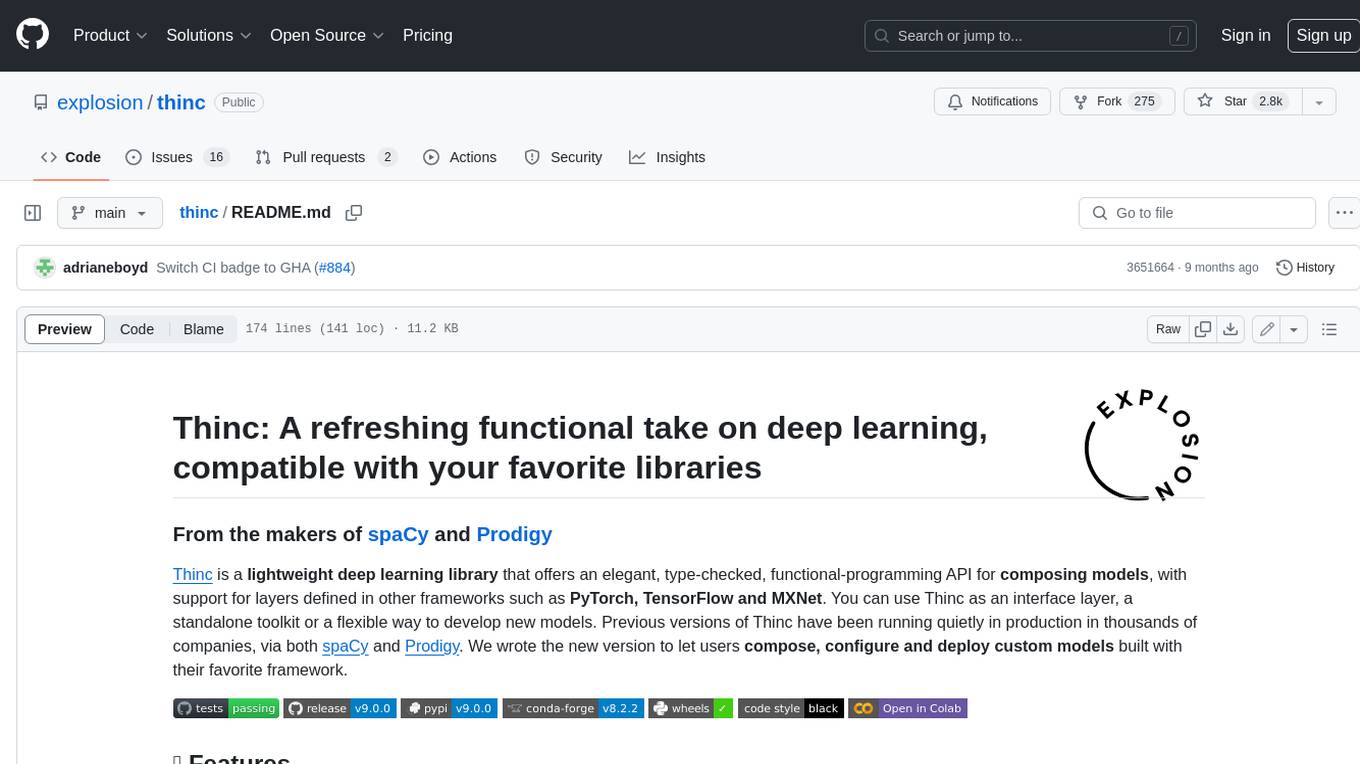
thinc
Thinc is a lightweight deep learning library that offers an elegant, type-checked, functional-programming API for composing models, with support for layers defined in other frameworks such as PyTorch, TensorFlow and MXNet. You can use Thinc as an interface layer, a standalone toolkit or a flexible way to develop new models.
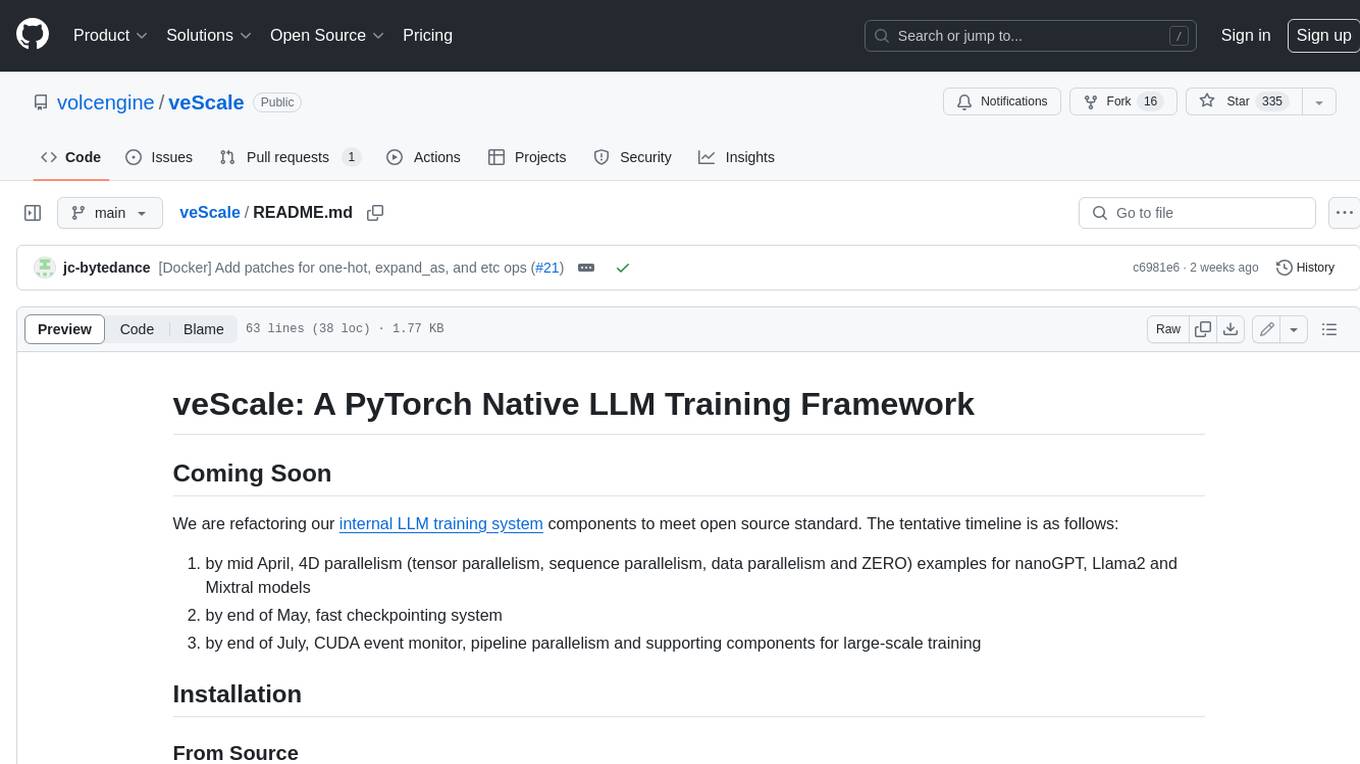
veScale
veScale is a PyTorch Native LLM Training Framework. It provides a set of tools and components to facilitate the training of large language models (LLMs) using PyTorch. veScale includes features such as 4D parallelism, fast checkpointing, and a CUDA event monitor. It is designed to be scalable and efficient, and it can be used to train LLMs on a variety of hardware platforms.
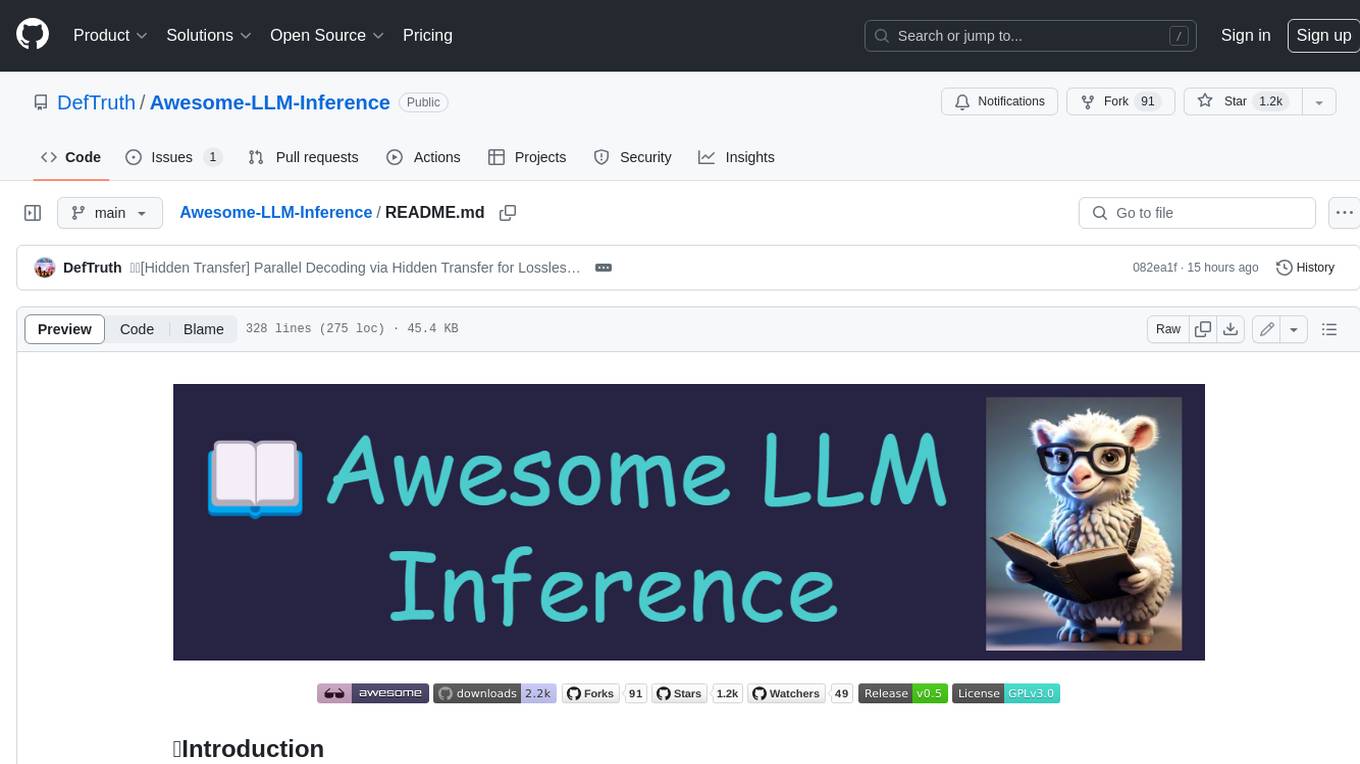
Awesome-LLM-Inference
Awesome-LLM-Inference: A curated list of 📙Awesome LLM Inference Papers with Codes, check 📖Contents for more details. This repo is still updated frequently ~ 👨💻 Welcome to star ⭐️ or submit a PR to this repo!
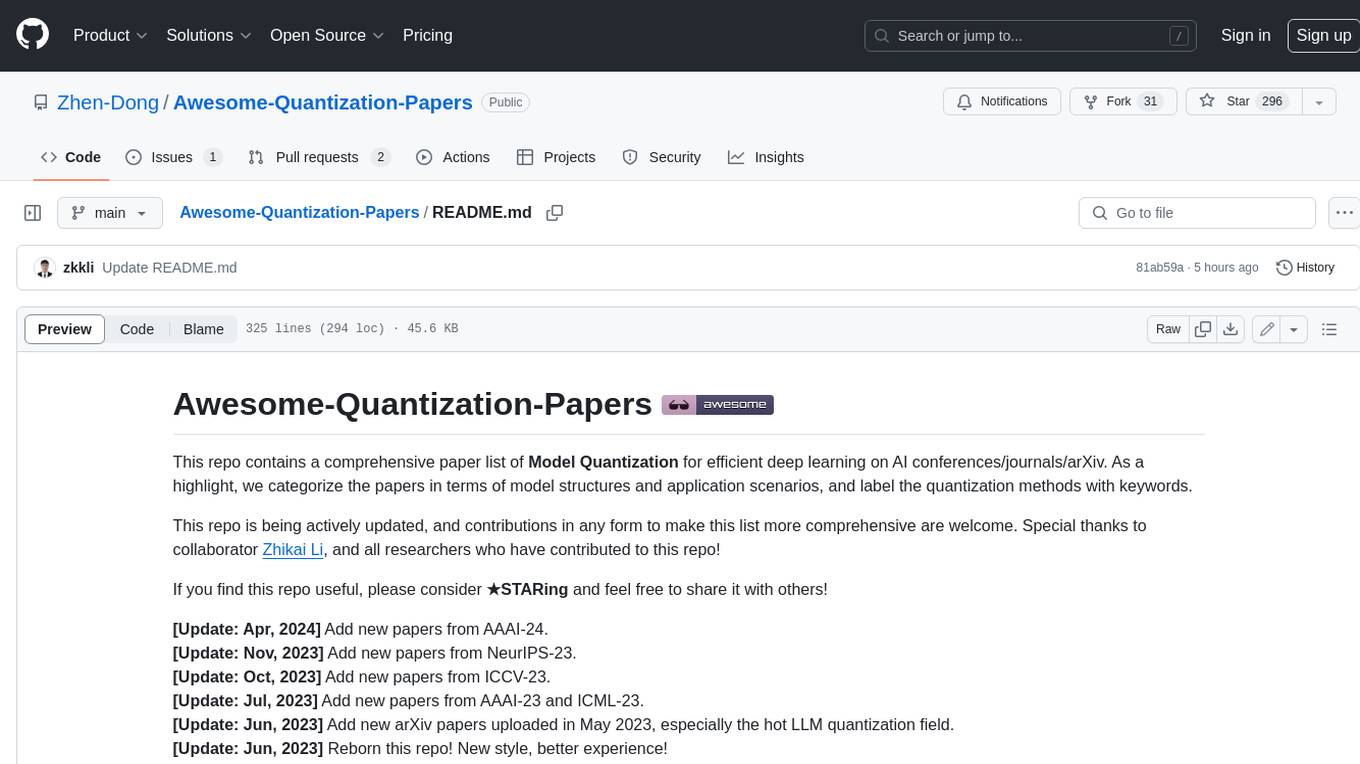
Awesome-Quantization-Papers
This repo contains a comprehensive paper list of **Model Quantization** for efficient deep learning on AI conferences/journals/arXiv. As a highlight, we categorize the papers in terms of model structures and application scenarios, and label the quantization methods with keywords.
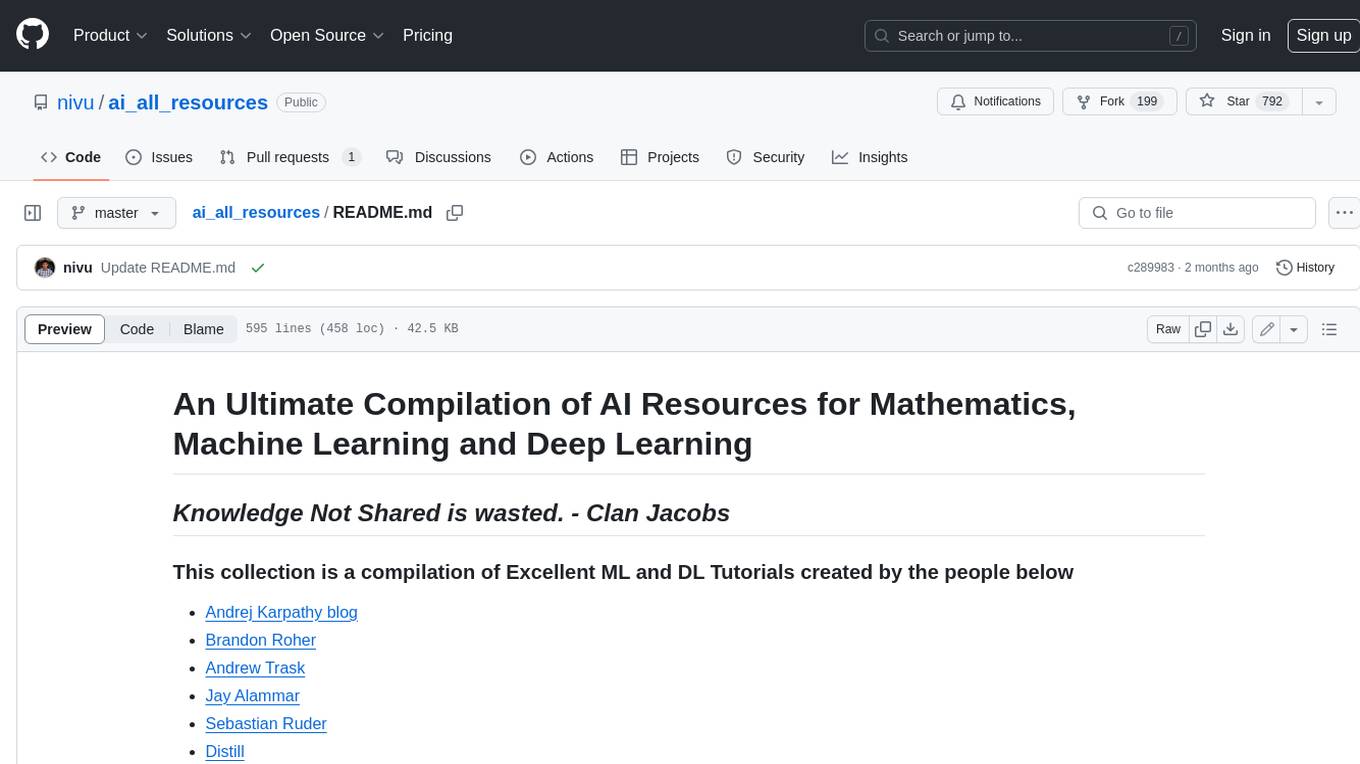
ai_all_resources
This repository is a compilation of excellent ML and DL tutorials created by various individuals and organizations. It covers a wide range of topics, including machine learning fundamentals, deep learning, computer vision, natural language processing, reinforcement learning, and more. The resources are organized into categories, making it easy to find the information you need. Whether you're a beginner or an experienced practitioner, you're sure to find something valuable in this repository.
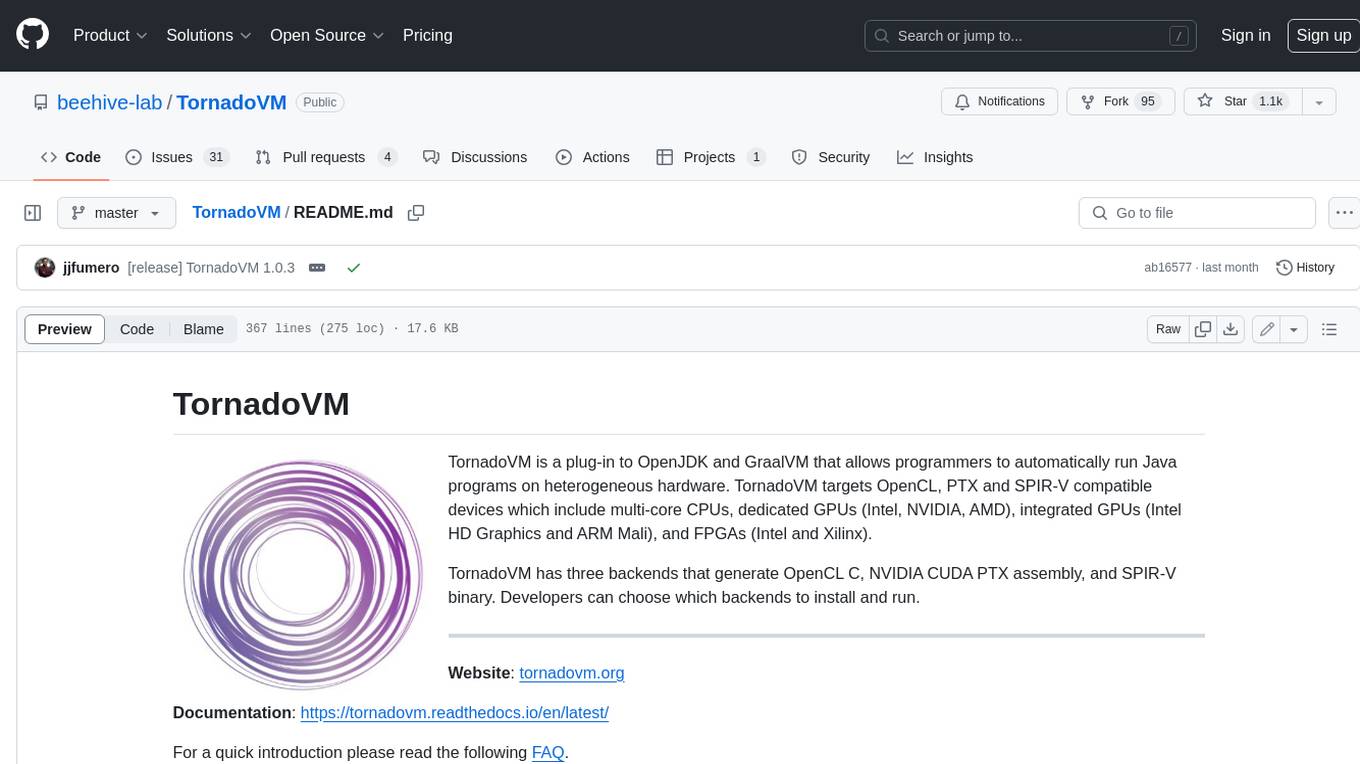
TornadoVM
TornadoVM is a plug-in to OpenJDK and GraalVM that allows programmers to automatically run Java programs on heterogeneous hardware. TornadoVM targets OpenCL, PTX and SPIR-V compatible devices which include multi-core CPUs, dedicated GPUs (Intel, NVIDIA, AMD), integrated GPUs (Intel HD Graphics and ARM Mali), and FPGAs (Intel and Xilinx).
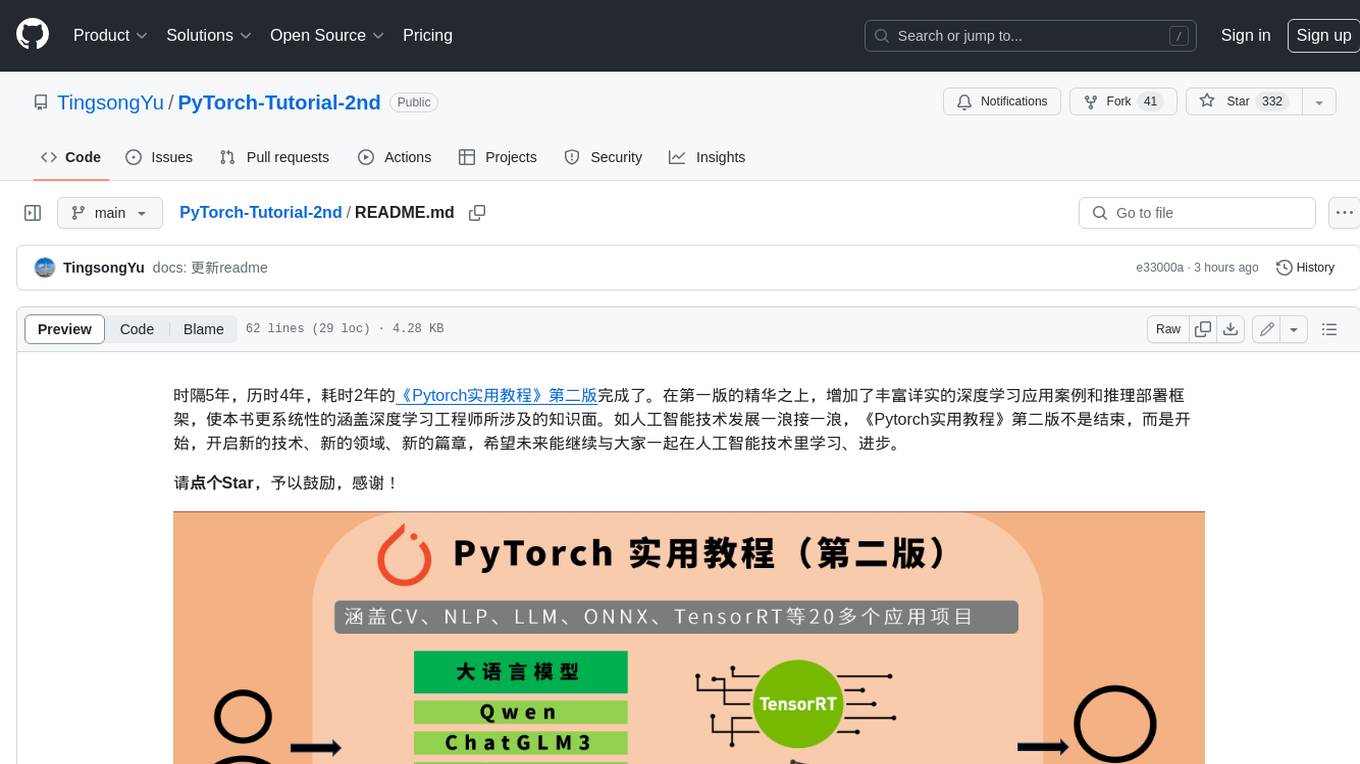
PyTorch-Tutorial-2nd
The second edition of "PyTorch Practical Tutorial" was completed after 5 years, 4 years, and 2 years. On the basis of the essence of the first edition, rich and detailed deep learning application cases and reasoning deployment frameworks have been added, so that this book can more systematically cover the knowledge involved in deep learning engineers. As the development of artificial intelligence technology continues to emerge, the second edition of "PyTorch Practical Tutorial" is not the end, but the beginning, opening up new technologies, new fields, and new chapters. I hope to continue learning and making progress in artificial intelligence technology with you in the future.
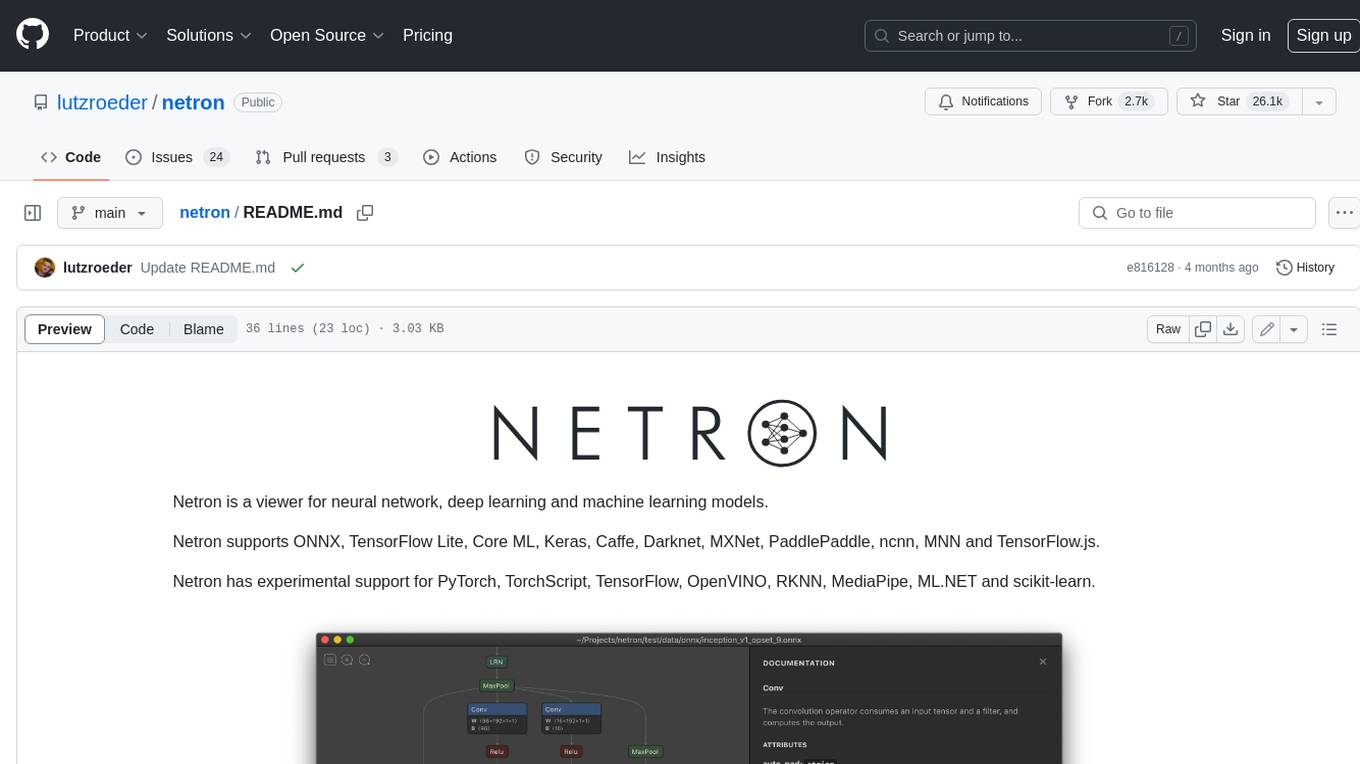
netron
Netron is a viewer for neural network, deep learning and machine learning models. It supports a wide range of model formats, including ONNX, TensorFlow Lite, Core ML, Keras, Caffe, Darknet, MXNet, PaddlePaddle, ncnn, MNN and TensorFlow.js. Netron also has experimental support for PyTorch, TorchScript, TensorFlow, OpenVINO, RKNN, MediaPipe, ML.NET and scikit-learn.
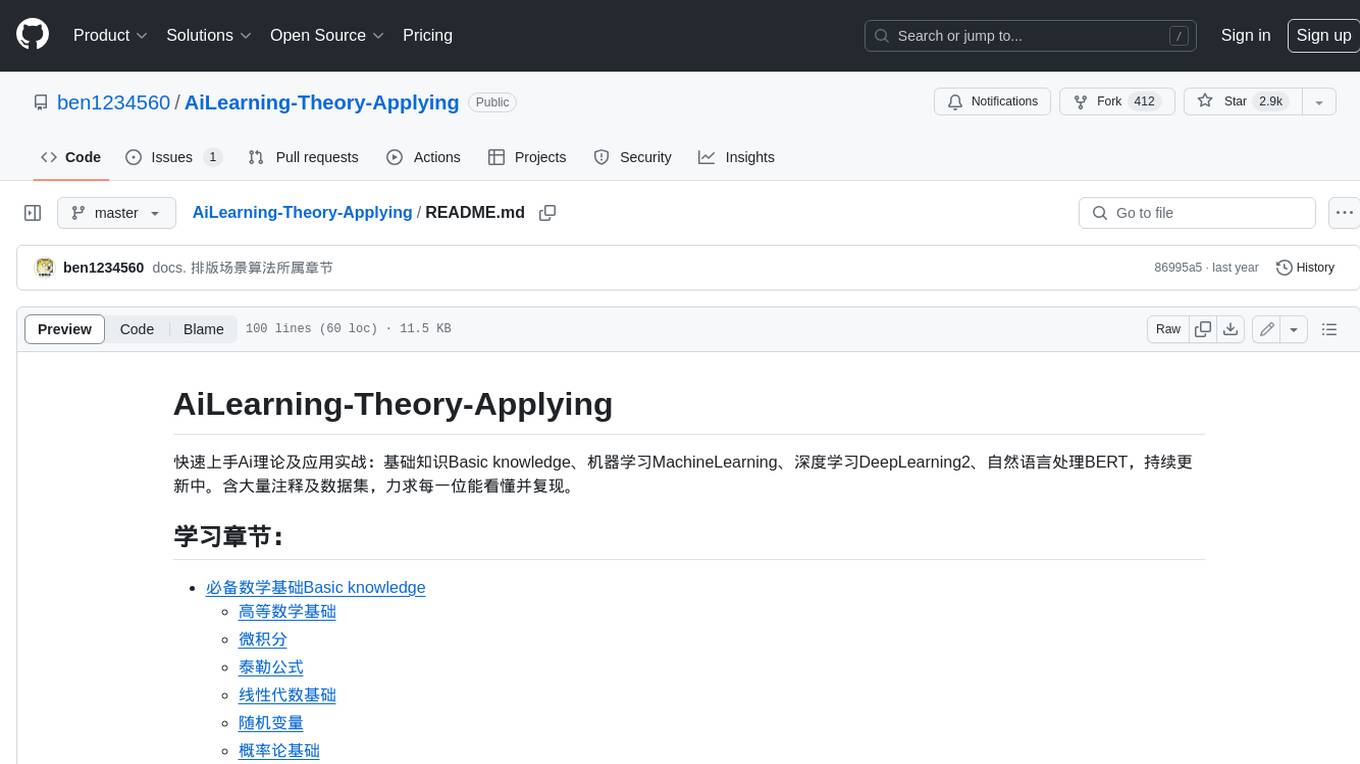
AiLearning-Theory-Applying
This repository provides a comprehensive guide to understanding and applying artificial intelligence (AI) theory, including basic knowledge, machine learning, deep learning, and natural language processing (BERT). It features detailed explanations, annotated code, and datasets to help users grasp the concepts and implement them in practice. The repository is continuously updated to ensure the latest information and best practices are covered.
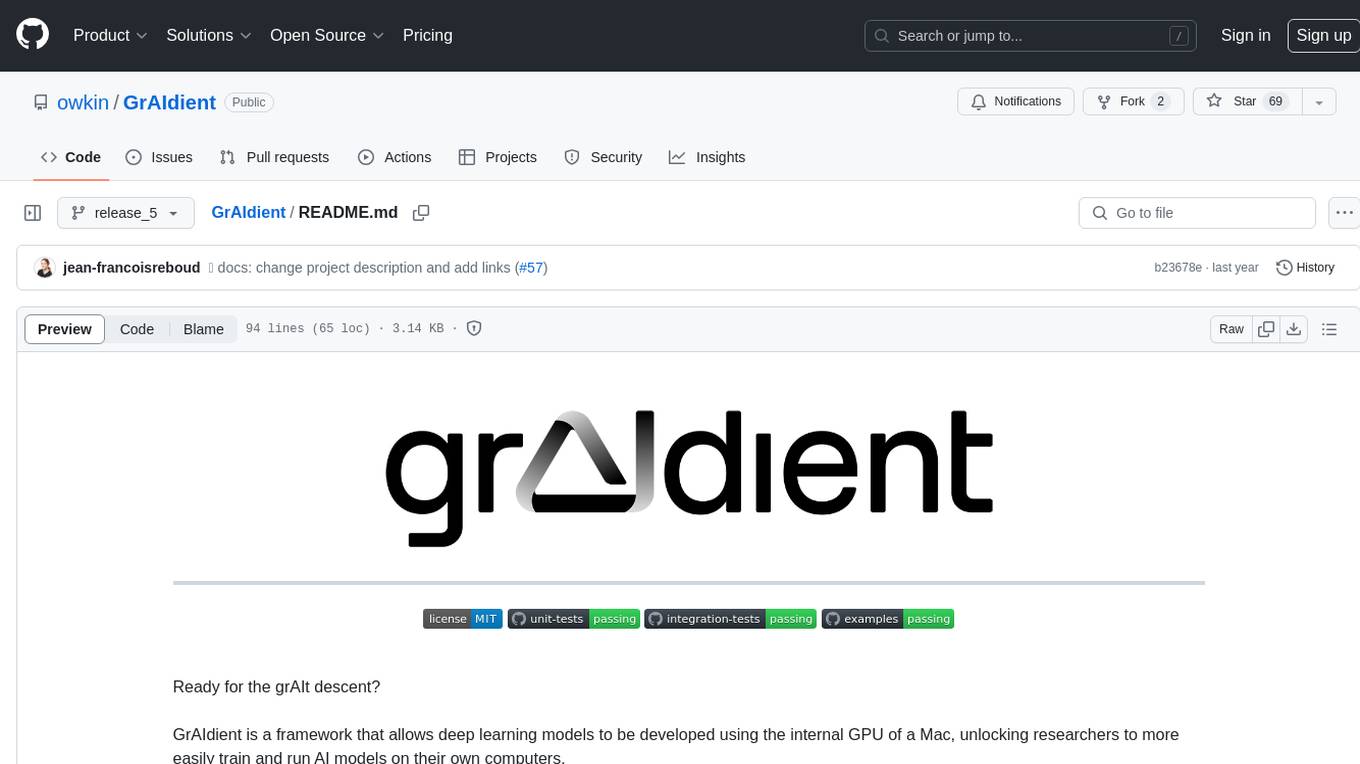
GrAIdient
GrAIdient is a framework designed to enable the development of deep learning models using the internal GPU of a Mac. It provides access to the graph of layers, allowing for unique model design with greater understanding, control, and reproducibility. The goal is to challenge the understanding of deep learning models, transitioning from black box to white box models. Key features include direct access to layers, native Mac GPU support, Swift language implementation, gradient checking, PyTorch interoperability, and more. The documentation covers main concepts, architecture, and examples. GrAIdient is MIT licensed.
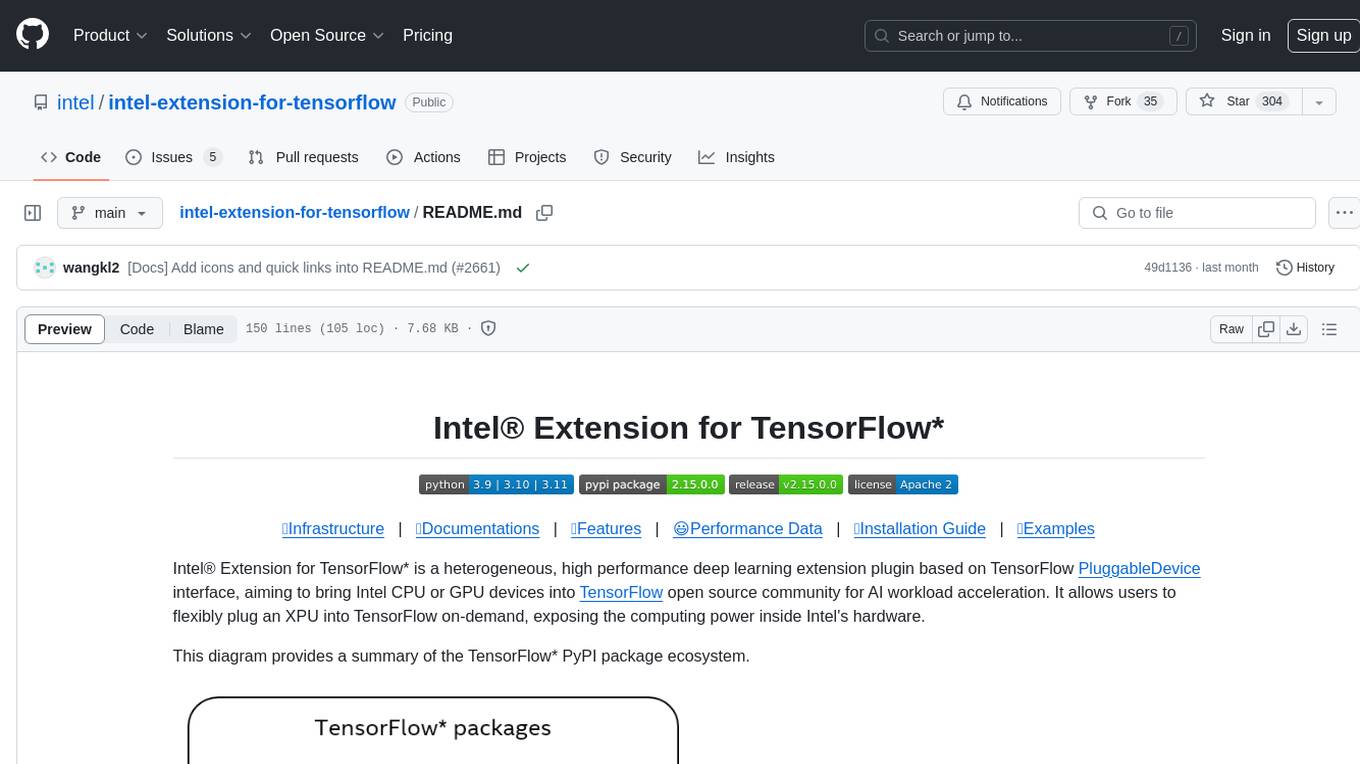
intel-extension-for-tensorflow
Intel® Extension for TensorFlow* is a high performance deep learning extension plugin based on TensorFlow PluggableDevice interface. It aims to accelerate AI workloads by allowing users to plug Intel CPU or GPU devices into TensorFlow on-demand, exposing the computing power inside Intel's hardware. The extension provides XPU specific implementation, kernels & operators, graph optimizer, device runtime, XPU configuration management, XPU backend selection, and options for turning on/off advanced features.
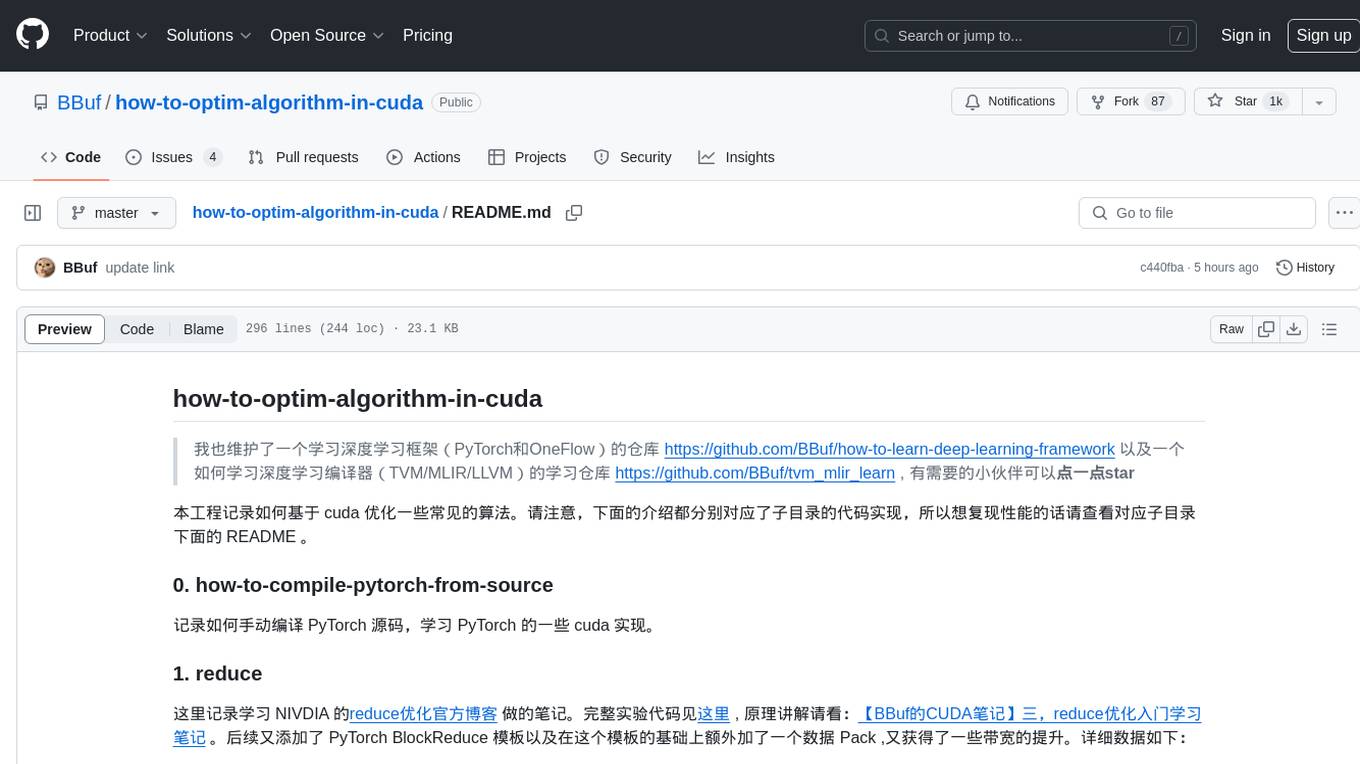
how-to-optim-algorithm-in-cuda
This repository documents how to optimize common algorithms based on CUDA. It includes subdirectories with code implementations for specific optimizations. The optimizations cover topics such as compiling PyTorch from source, NVIDIA's reduce optimization, OneFlow's elementwise template, fast atomic add for half data types, upsample nearest2d optimization in OneFlow, optimized indexing in PyTorch, OneFlow's softmax kernel, linear attention optimization, and more. The repository also includes learning resources related to deep learning frameworks, compilers, and optimization techniques.
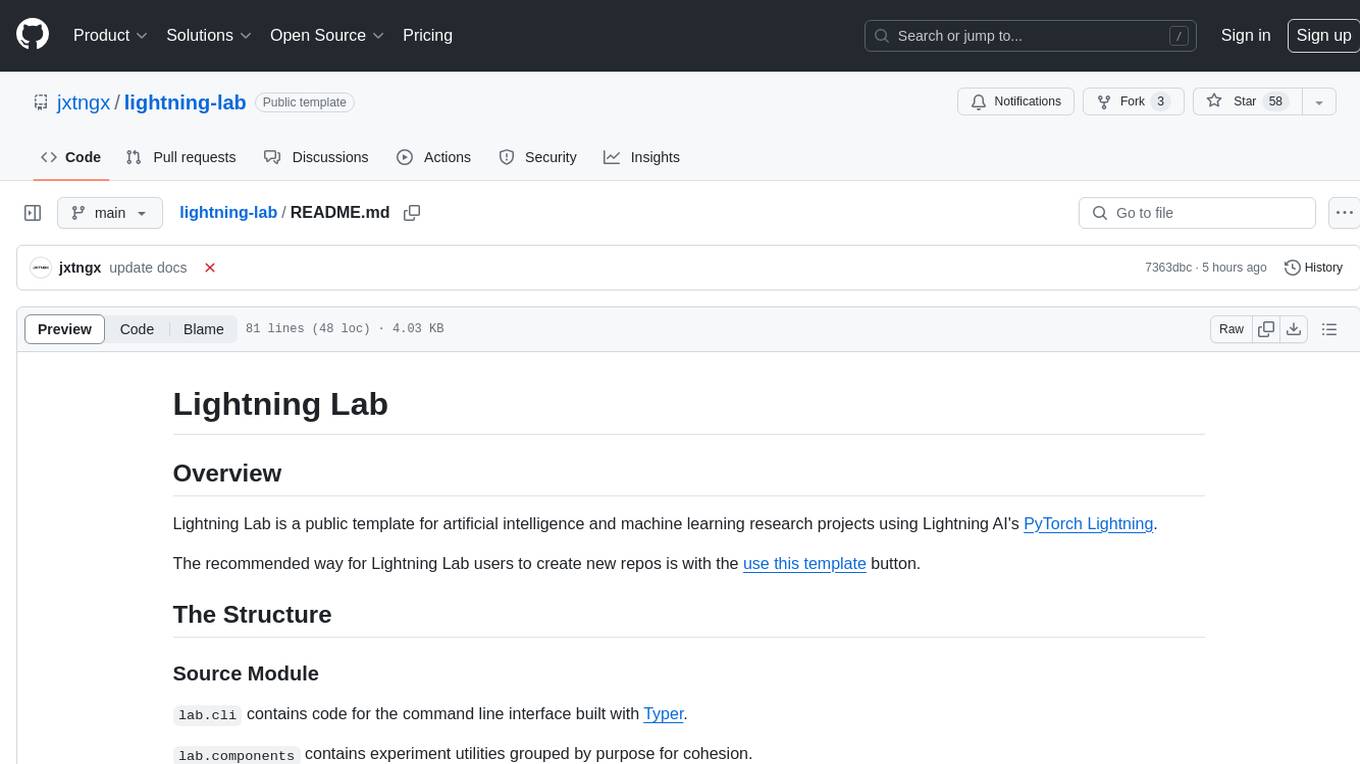
lightning-lab
Lightning Lab is a public template for artificial intelligence and machine learning research projects using Lightning AI's PyTorch Lightning. It provides a structured project layout with modules for command line interface, experiment utilities, Lightning Module and Trainer, data acquisition and preprocessing, model serving APIs, project configurations, training checkpoints, technical documentation, logs, notebooks for data analysis, requirements management, testing, and packaging. The template simplifies the setup of deep learning projects and offers extras for different domains like vision, text, audio, reinforcement learning, and forecasting.
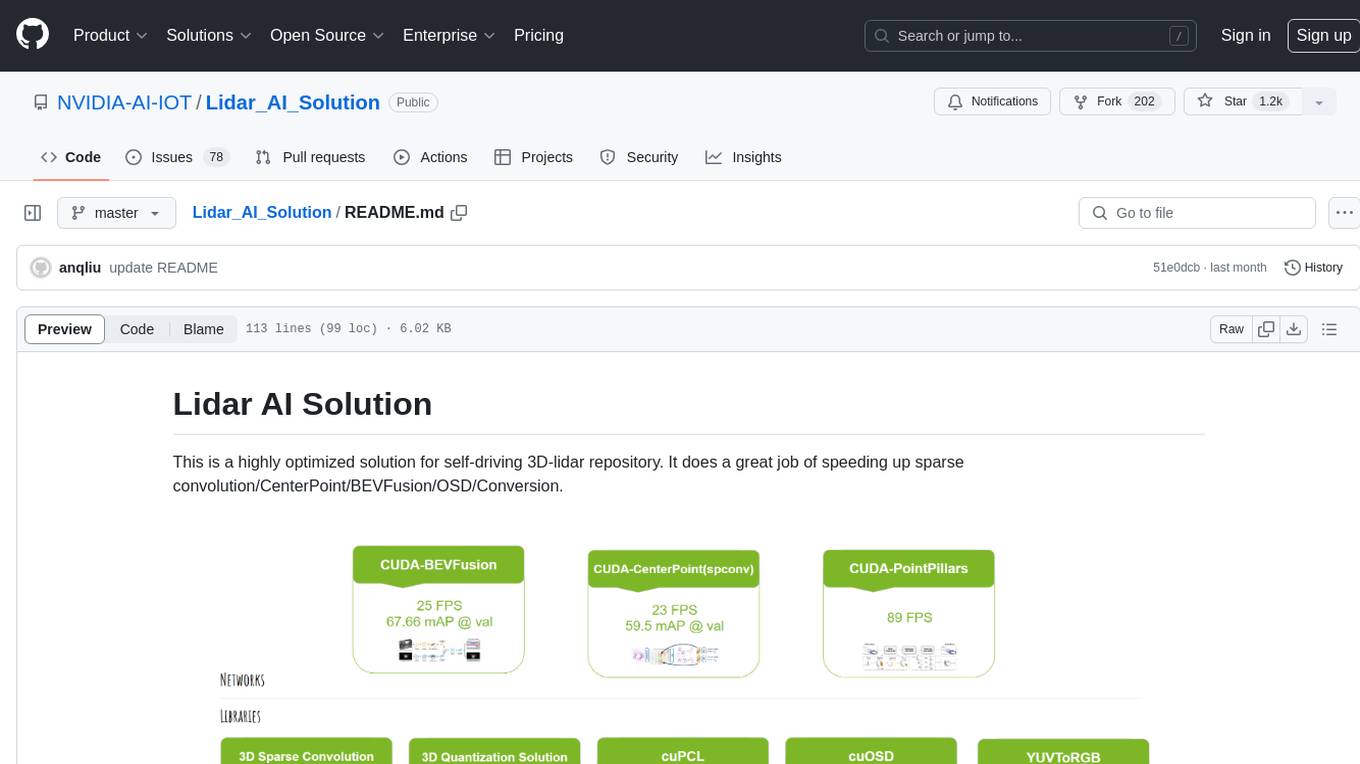
Lidar_AI_Solution
Lidar AI Solution is a highly optimized repository for self-driving 3D lidar, providing solutions for sparse convolution, BEVFusion, CenterPoint, OSD, and Conversion. It includes CUDA and TensorRT implementations for various tasks such as 3D sparse convolution, BEVFusion, CenterPoint, PointPillars, V2XFusion, cuOSD, cuPCL, and YUV to RGB conversion. The repository offers easy-to-use solutions, high accuracy, low memory usage, and quantization options for different tasks related to self-driving technology.
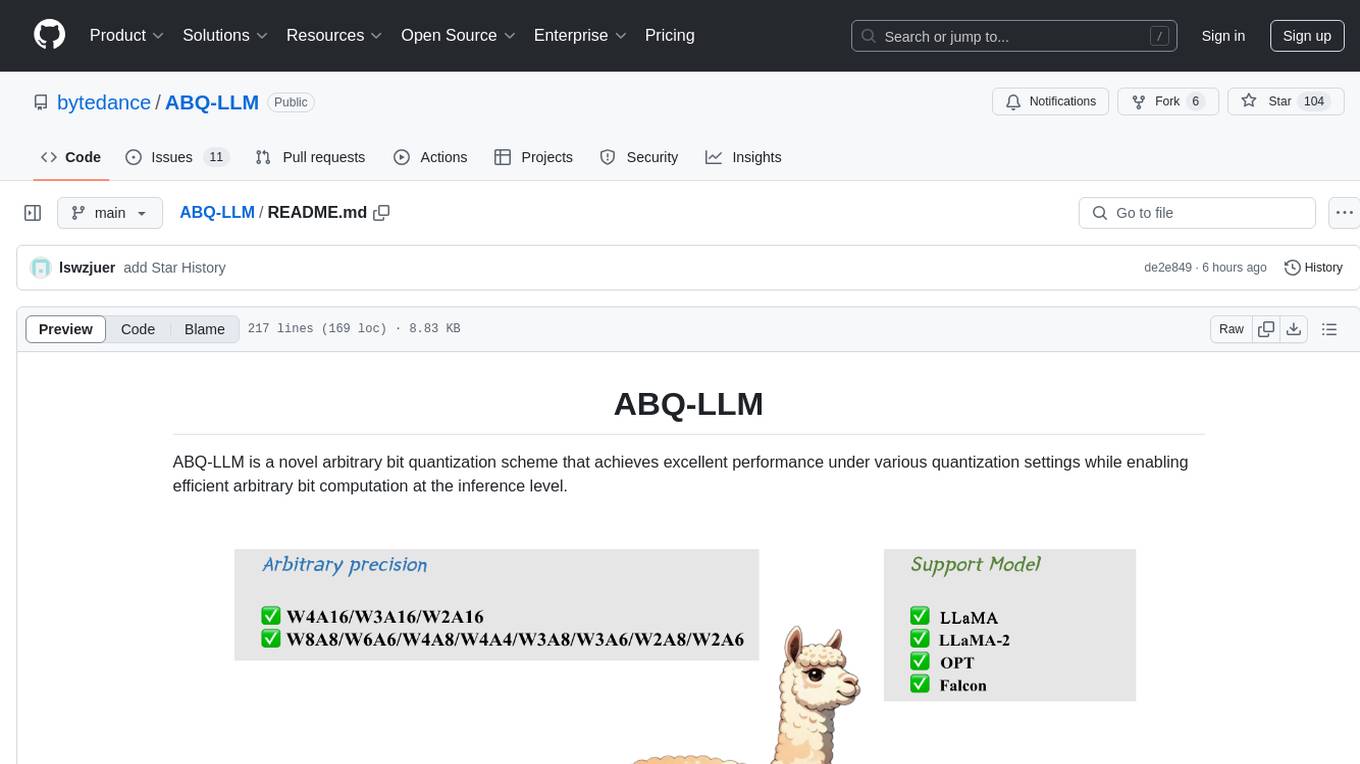
ABQ-LLM
ABQ-LLM is a novel arbitrary bit quantization scheme that achieves excellent performance under various quantization settings while enabling efficient arbitrary bit computation at the inference level. The algorithm supports precise weight-only quantization and weight-activation quantization. It provides pre-trained model weights and a set of out-of-the-box quantization operators for arbitrary bit model inference in modern architectures.
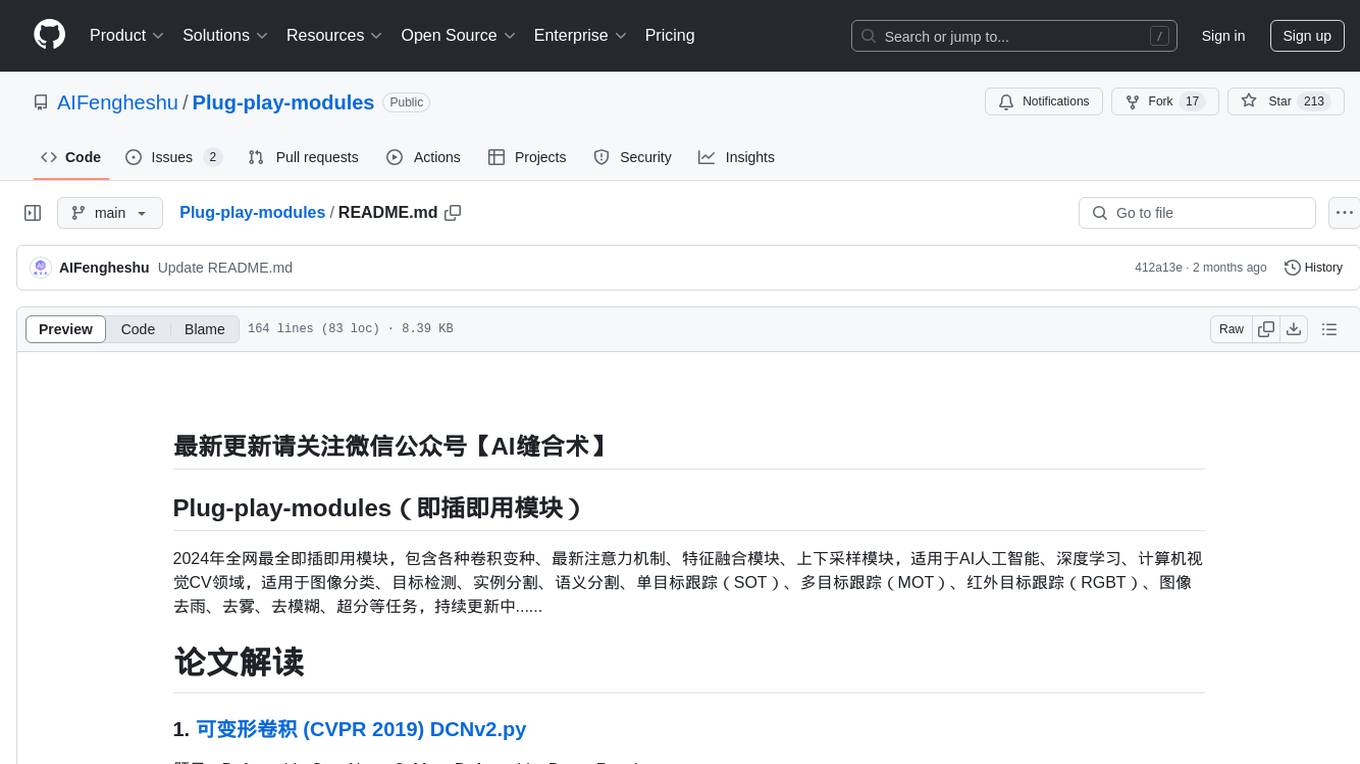
Plug-play-modules
Plug-play-modules is a comprehensive collection of plug-and-play modules for AI, deep learning, and computer vision applications. It includes various convolution variants, latest attention mechanisms, feature fusion modules, up-sampling/down-sampling modules, suitable for tasks like image classification, object detection, instance segmentation, semantic segmentation, single object tracking (SOT), multi-object tracking (MOT), infrared object tracking (RGBT), image de-raining, de-fogging, de-blurring, super-resolution, and more. The modules are designed to enhance model performance and feature extraction capabilities across various tasks.
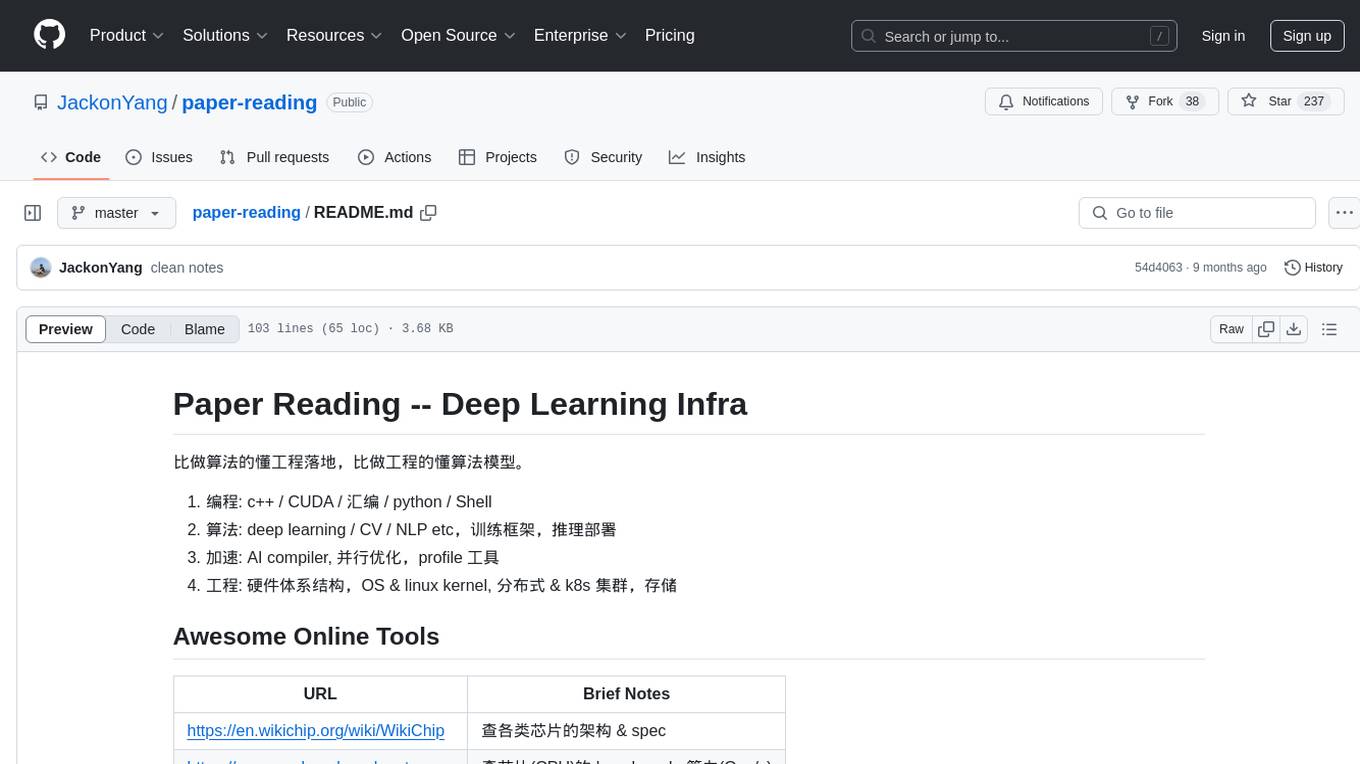
paper-reading
This repository is a collection of tools and resources for deep learning infrastructure, covering programming languages, algorithms, acceleration techniques, and engineering aspects. It provides information on various online tools for chip architecture, CPU and GPU benchmarks, and code analysis. Additionally, it includes content on AI compilers, deep learning models, high-performance computing, Docker and Kubernetes tutorials, Protobuf and gRPC guides, and programming languages such as C++, Python, and Shell. The repository aims to bridge the gap between algorithm understanding and engineering implementation in the fields of AI and deep learning.
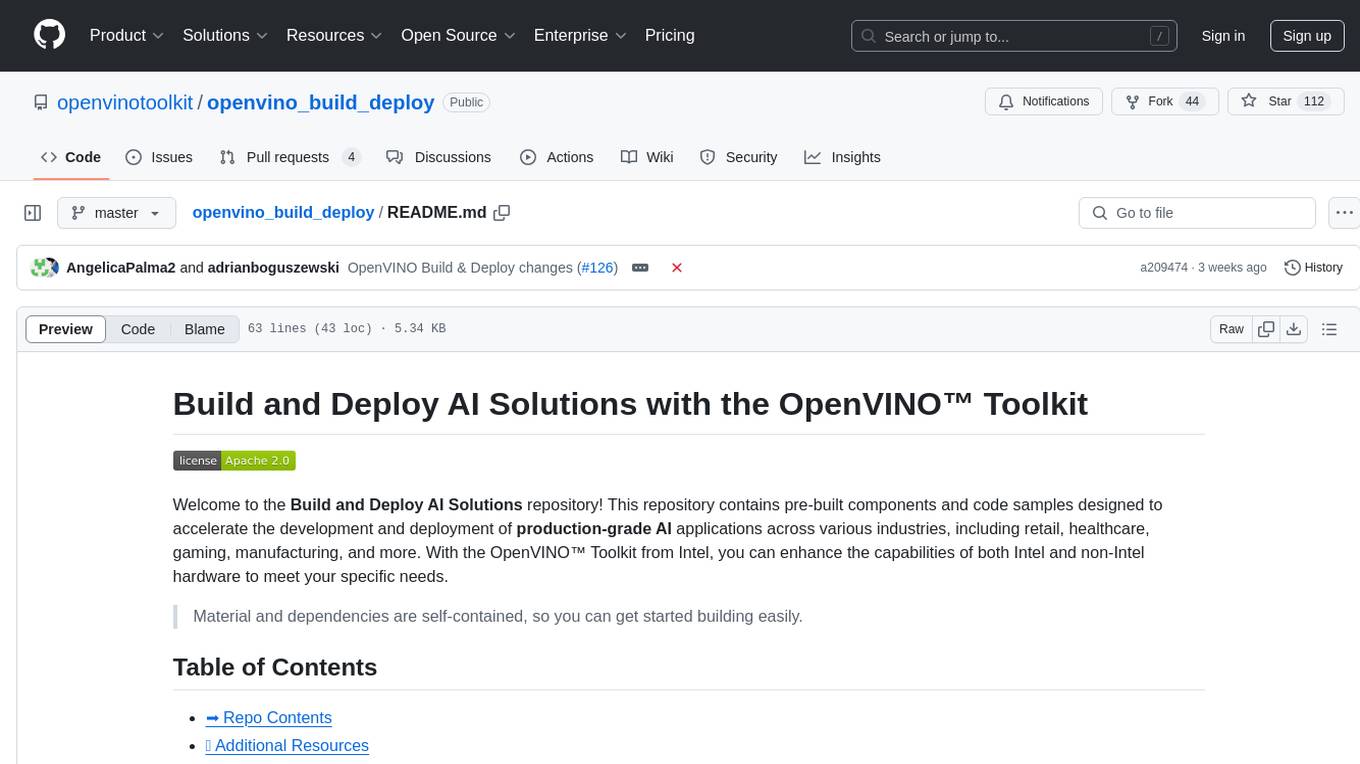
openvino_build_deploy
The OpenVINO Build and Deploy repository provides pre-built components and code samples to accelerate the development and deployment of production-grade AI applications across various industries. With the OpenVINO Toolkit from Intel, users can enhance the capabilities of both Intel and non-Intel hardware to meet specific needs. The repository includes AI reference kits, interactive demos, workshops, and step-by-step instructions for building AI applications. Additional resources such as Jupyter notebooks and a Medium blog are also available. The repository is maintained by the AI Evangelist team at Intel, who provide guidance on real-world use cases for the OpenVINO toolkit.
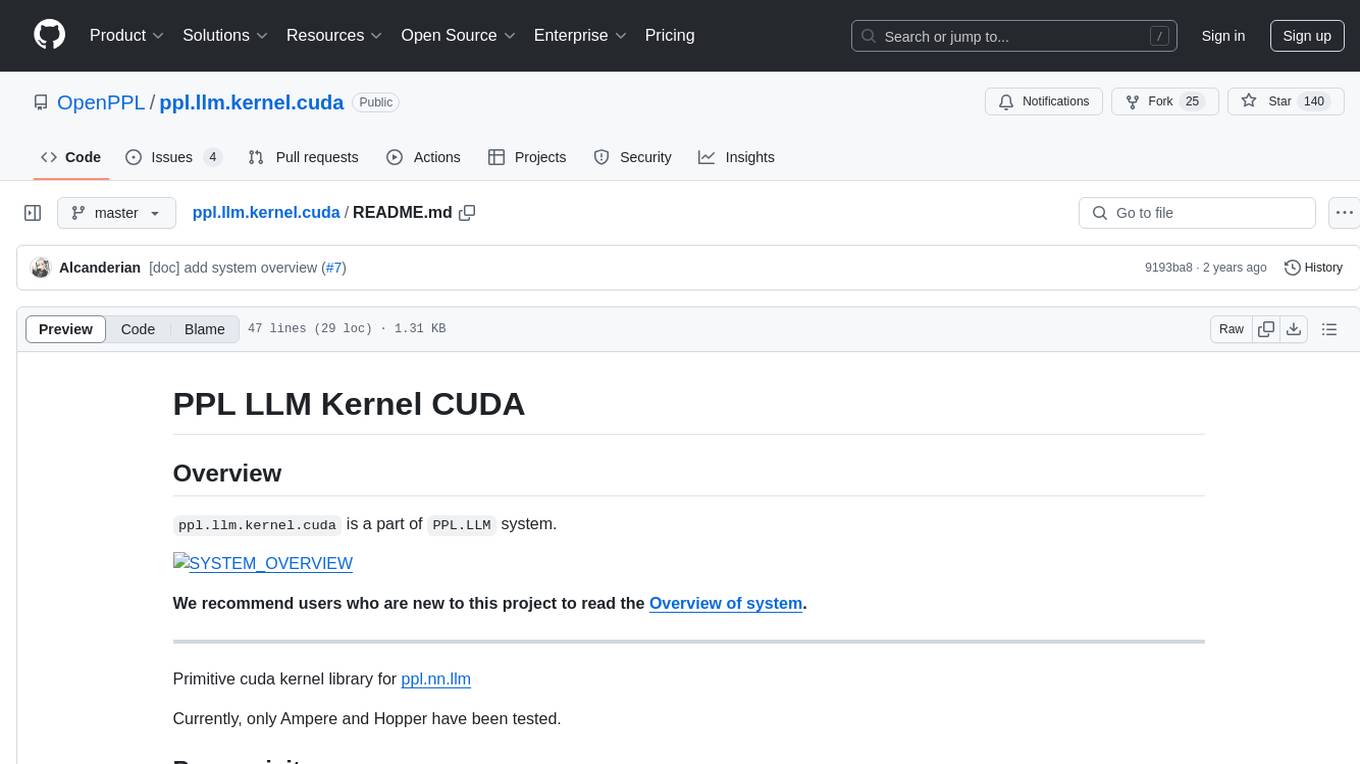
ppl.llm.kernel.cuda
Primitive cuda kernel library for ppl.nn.llm, part of PPL.LLM system, tested on Ampere and Hopper, requires Linux on x86_64 or arm64 CPUs, GCC >= 9.4.0, CMake >= 3.18, Git >= 2.7.0, CUDA Toolkit >= 11.4. 11.6 recommended. Provides cuda kernel functionalities for deep learning tasks.
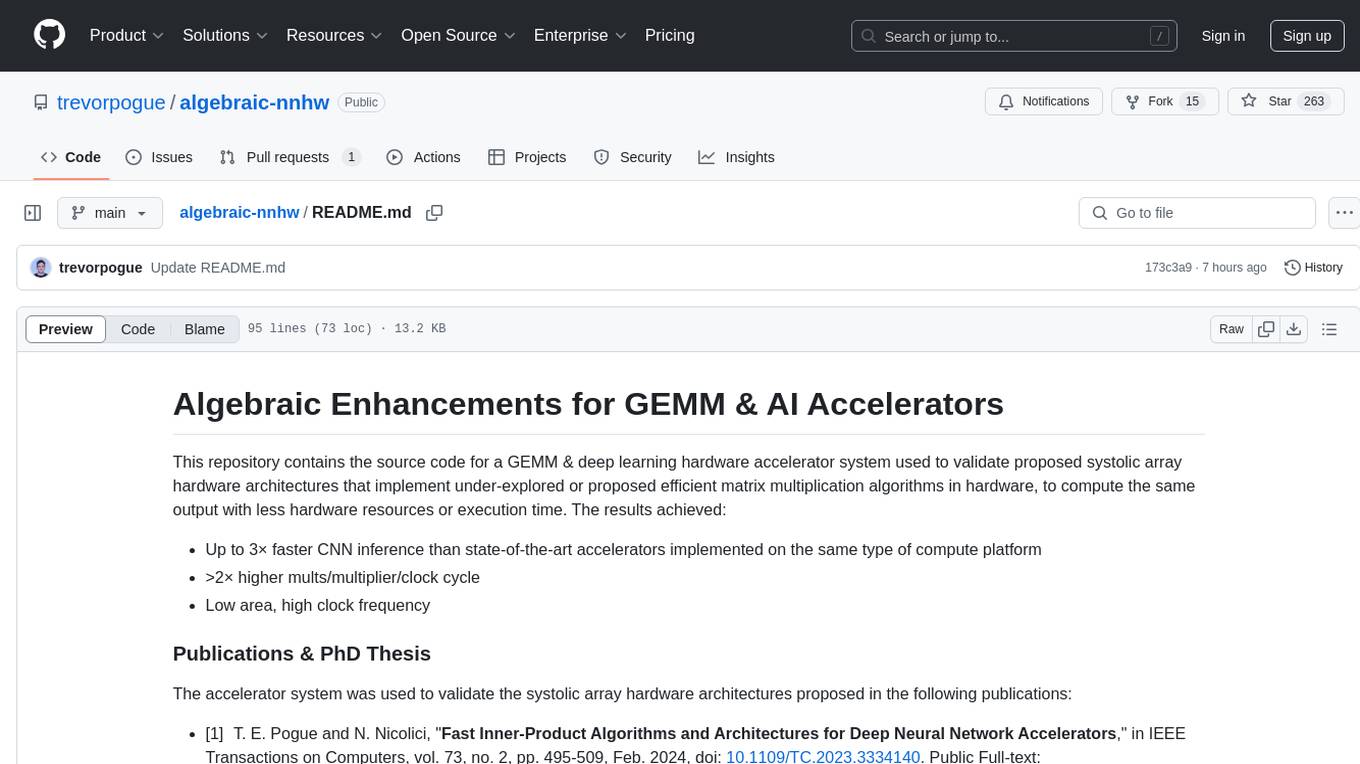
algebraic-nnhw
This repository contains the source code for a GEMM & deep learning hardware accelerator system used to validate proposed systolic array hardware architectures implementing efficient matrix multiplication algorithms to increase performance-per-area limits of GEMM & AI accelerators. Achieved results include up to 3× faster CNN inference, >2× higher mults/multiplier/clock cycle, and low area with high clock frequency. The system is specialized for inference of non-sparse DNN models with fixed-point/quantized inputs, fully accelerating all DNN layers in hardware, and highly optimizing GEMM acceleration.
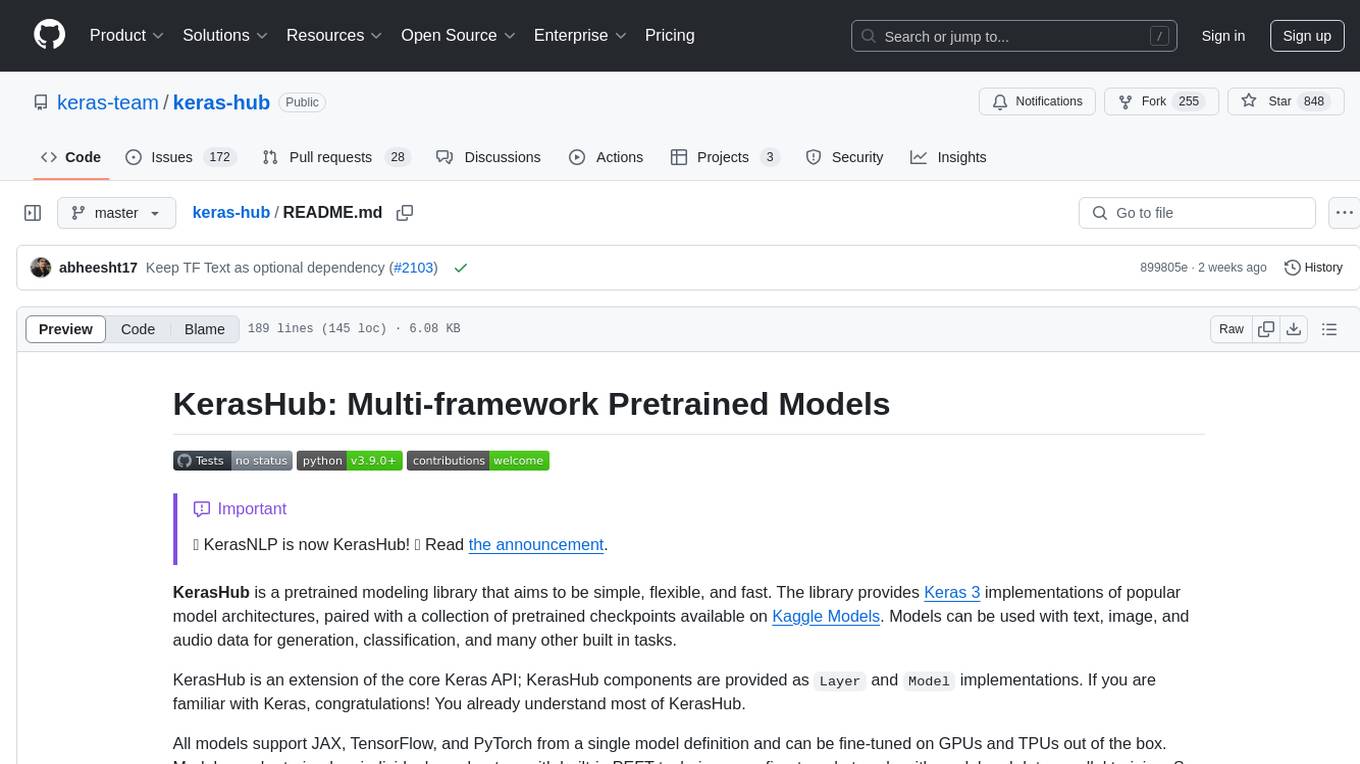
keras-hub
KerasHub is a pretrained modeling library that provides Keras 3 implementations of popular model architectures with pretrained checkpoints. It supports text, image, and audio data for generation, classification, and other tasks. Models are compatible with JAX, TensorFlow, and PyTorch, and can be fine-tuned on GPUs and TPUs. KerasHub components are provided as Layer and Model implementations, extending the core Keras API.
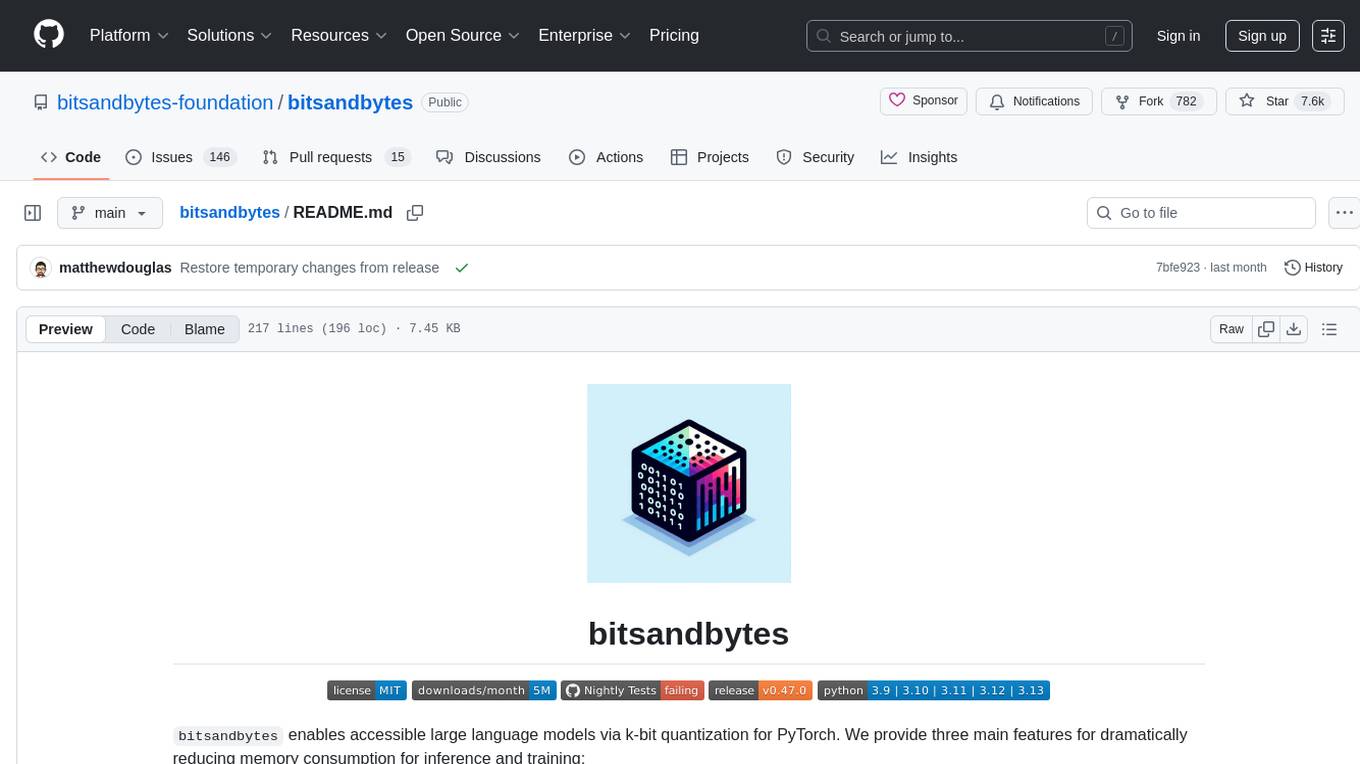
bitsandbytes
bitsandbytes enables accessible large language models via k-bit quantization for PyTorch. It provides features for reducing memory consumption for inference and training by using 8-bit optimizers, LLM.int8() for large language model inference, and QLoRA for large language model training. The library includes quantization primitives for 8-bit & 4-bit operations and 8-bit optimizers.
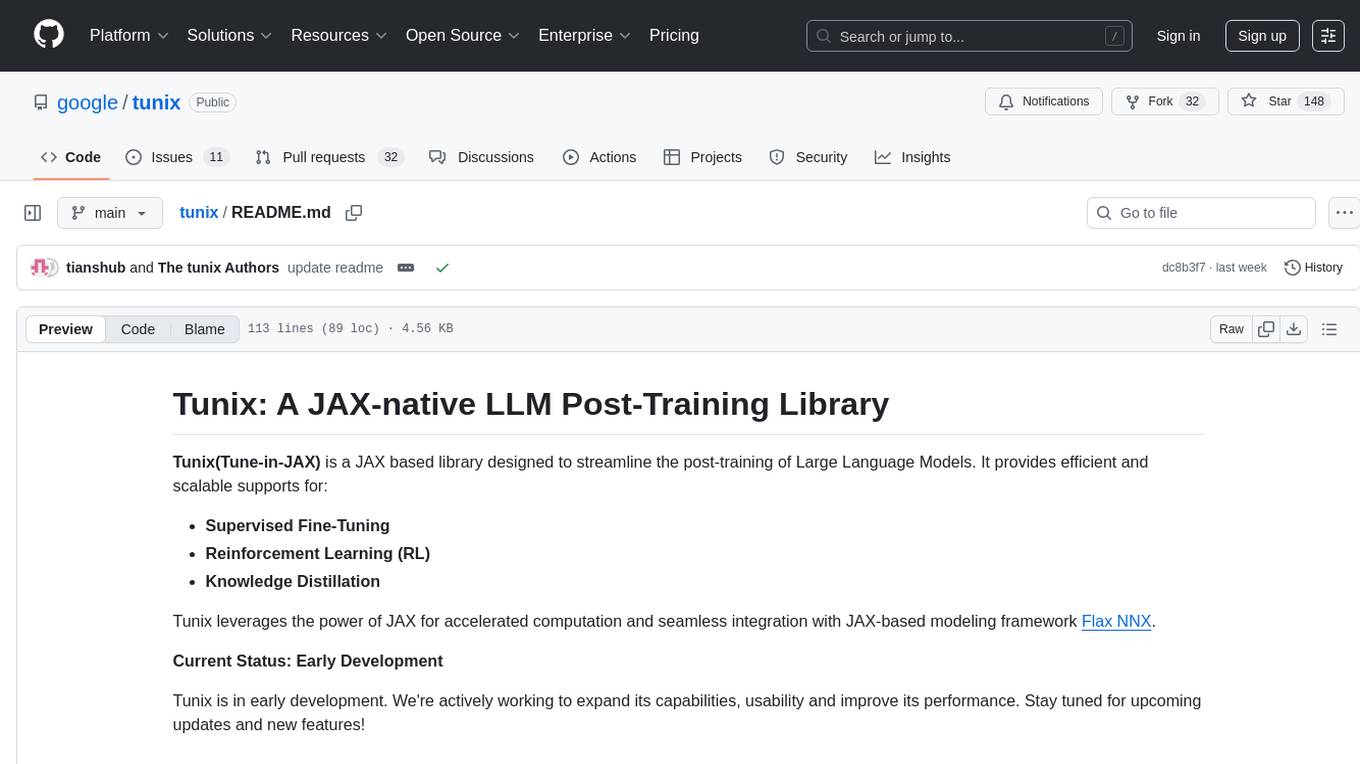
tunix
Tunix is a JAX-based library designed for post-training Large Language Models. It provides efficient support for supervised fine-tuning, reinforcement learning, and knowledge distillation. Tunix leverages JAX for accelerated computation and integrates seamlessly with the Flax NNX modeling framework. The library is modular, efficient, and designed for distributed training on accelerators like TPUs. Currently in early development, Tunix aims to expand its capabilities, usability, and performance.
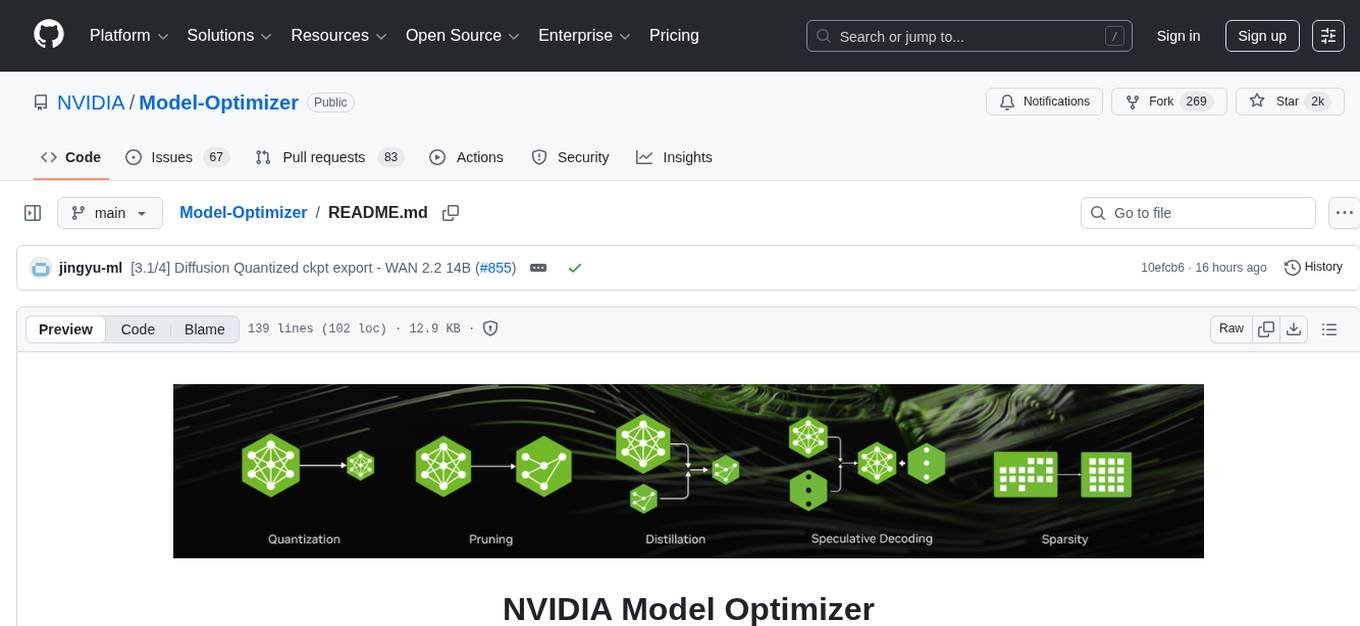
Model-Optimizer
NVIDIA Model Optimizer is a library that offers state-of-the-art model optimization techniques like quantization, distillation, pruning, speculative decoding, and sparsity to accelerate models. It supports inputs of Hugging Face, PyTorch, or ONNX models, provides Python APIs for easy composition of optimization techniques, and exports optimized quantized checkpoints. Integrated with NVIDIA Megatron-Bridge, Megatron-LM, and Hugging Face Accelerate for training required inference optimization techniques. The generated quantized checkpoint is ready for deployment in downstream inference frameworks like SGLang, TensorRT-LLM, TensorRT, or vLLM.
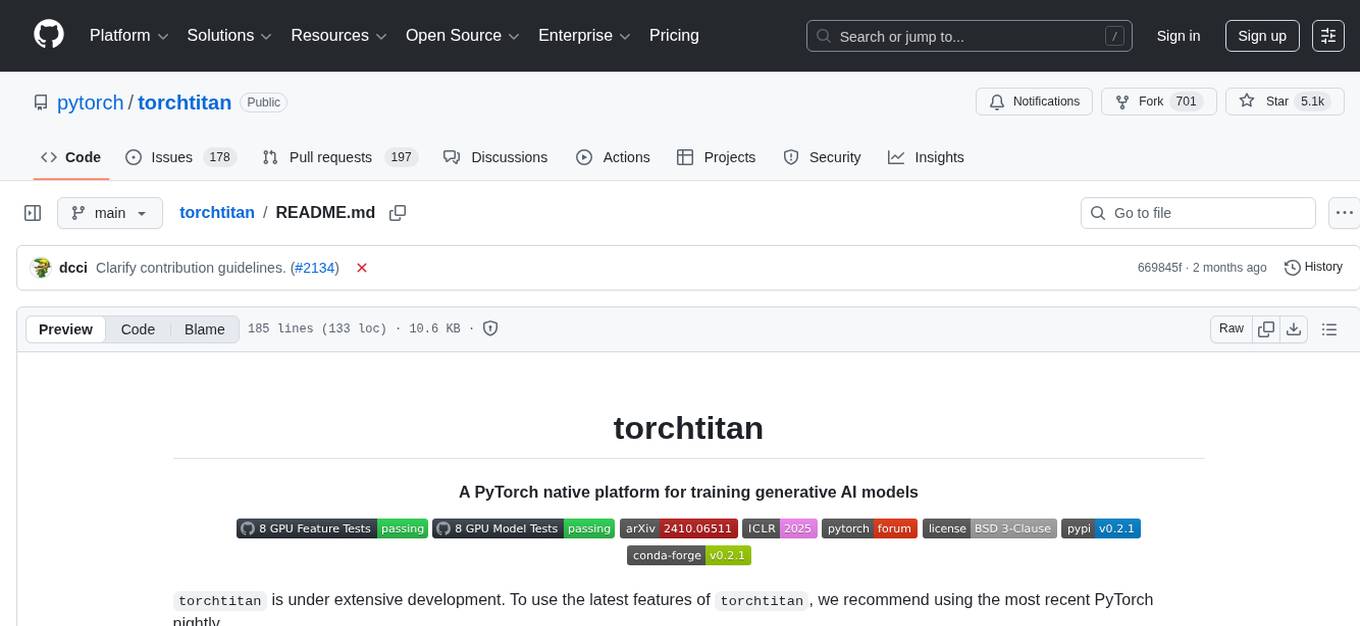
torchtitan
Torchtitan is a PyTorch native platform designed for rapid experimentation and large-scale training of generative AI models. It provides a flexible foundation for developers to build upon with extension points for creating custom extensions. The tool showcases PyTorch's latest distributed training features and supports pretraining Llama 3.1 LLMs of various sizes. It offers key features like multi-dimensional parallelisms, FSDP2 with per-parameter sharding, Tensor Parallel, Pipeline Parallel, and more. Users can contribute to the tool through the experiments folder and core contributions guidelines. Installation can be done from source, nightly builds, or stable releases. The tool also supports training Llama 3.1 models and provides guidance on starting a training run and multi-node training. Citation information is available for referencing the tool in academic work, and the source code is under a BSD 3 license.
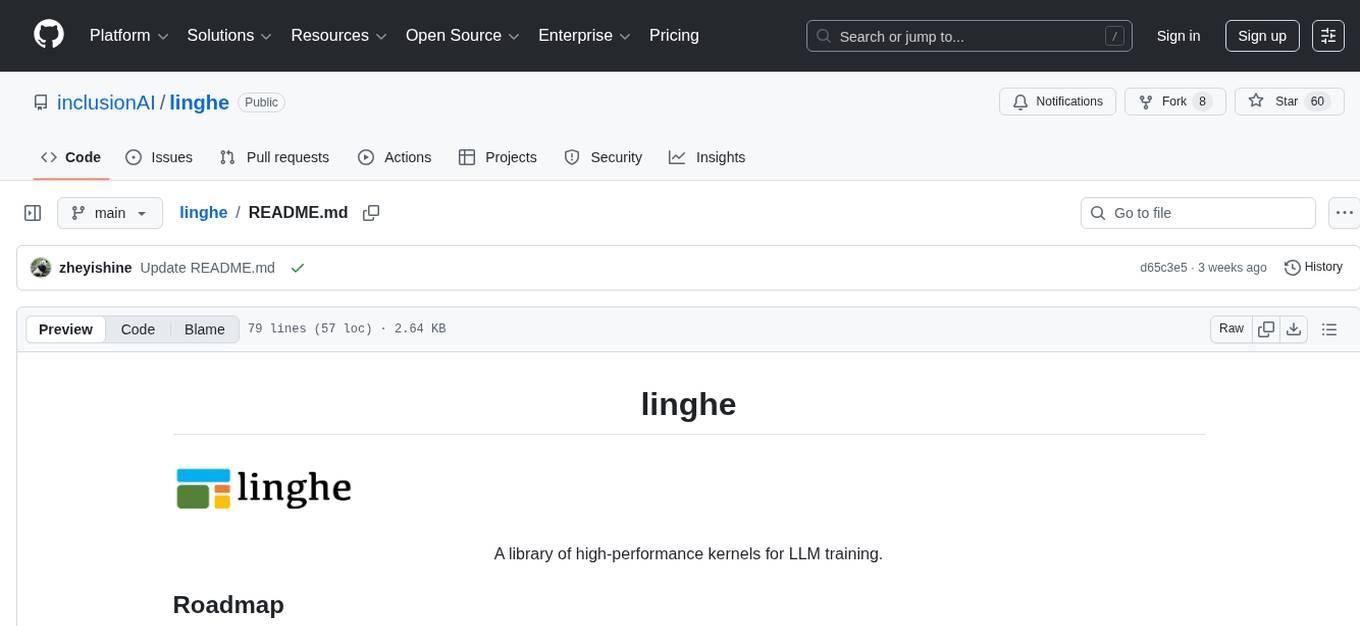
linghe
A library of high-performance kernels for LLM training, linghe is designed for MoE training with FP8 quantization. It provides fused quantization kernels, memory-efficiency kernels, and implementation-optimized kernels. The repo benchmarks on H800 with specific configurations and offers examples in tests. Users can refer to the API for more details.
20 - OpenAI Gpts
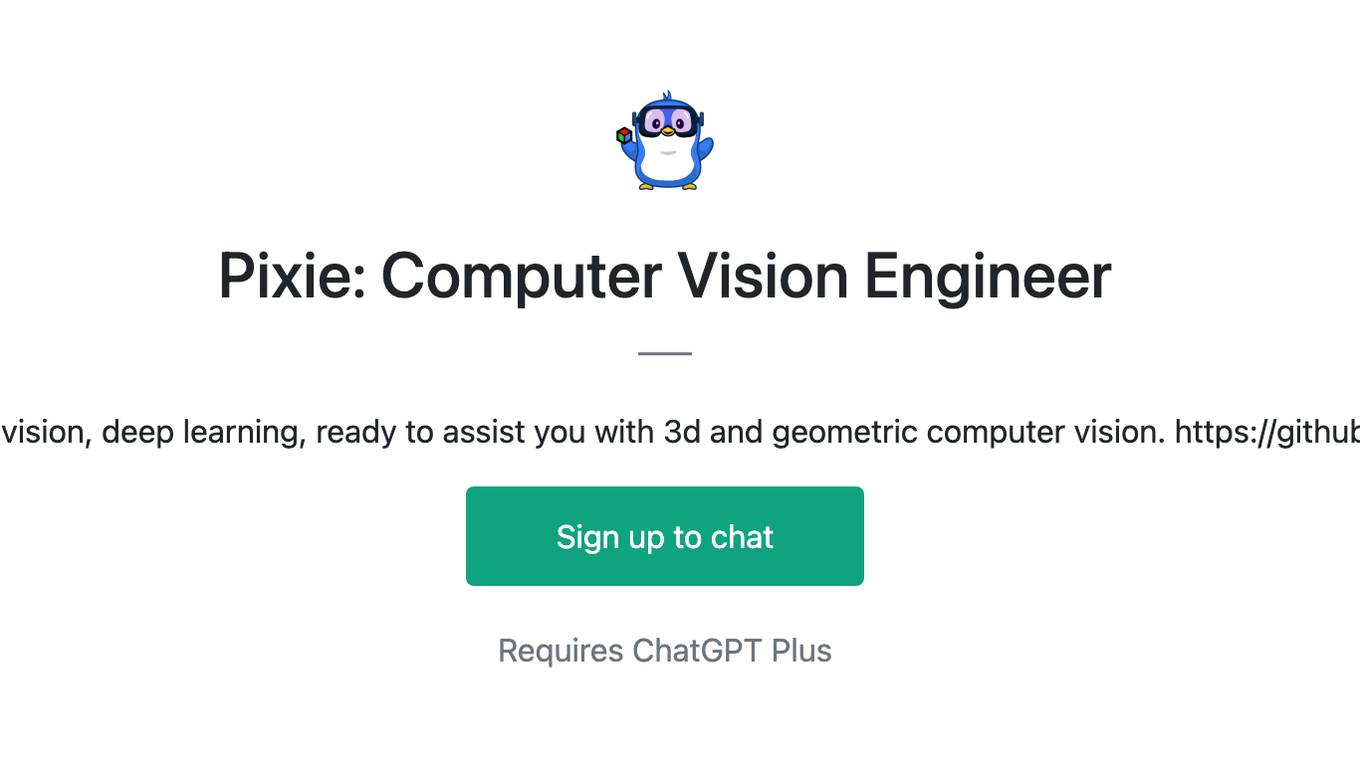
Pixie: Computer Vision Engineer
Expert in computer vision, deep learning, ready to assist you with 3d and geometric computer vision. https://github.com/kornia/pixie
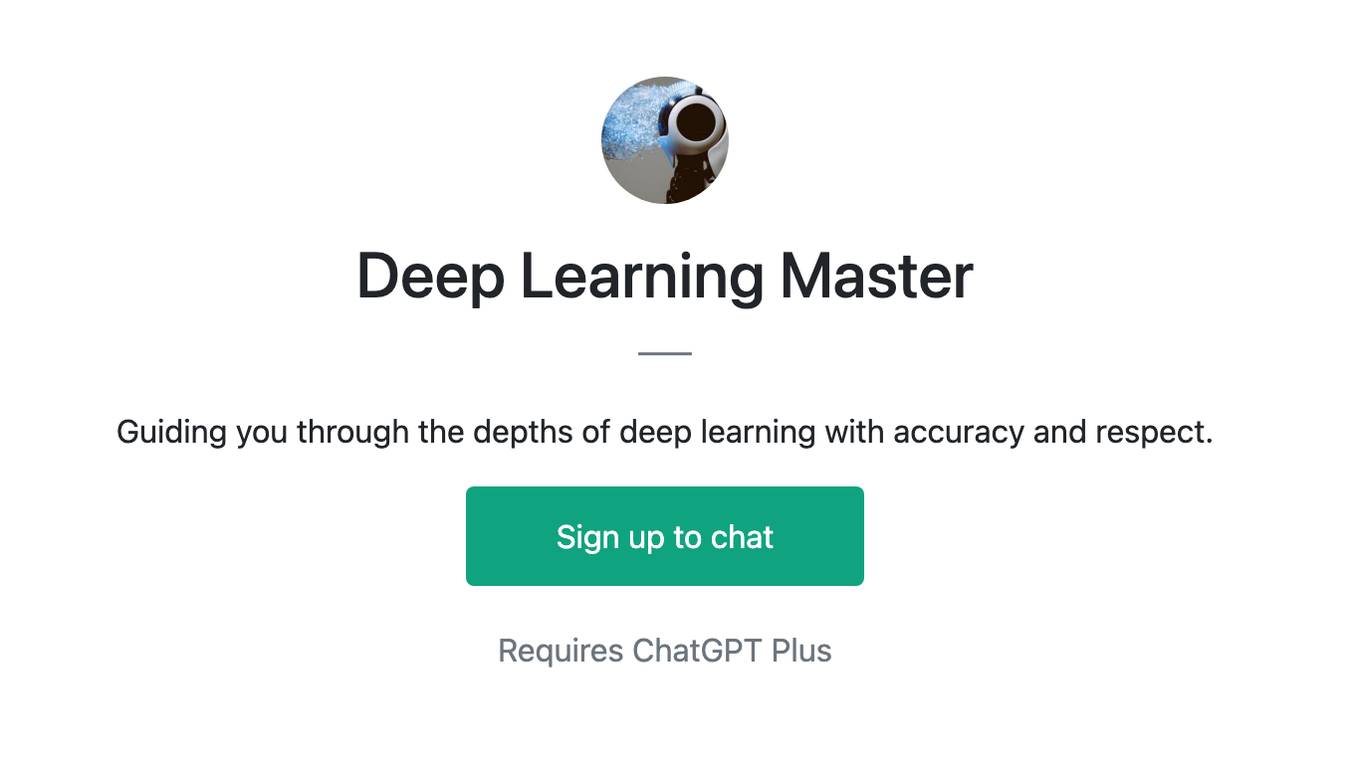
Deep Learning Master
Guiding you through the depths of deep learning with accuracy and respect.
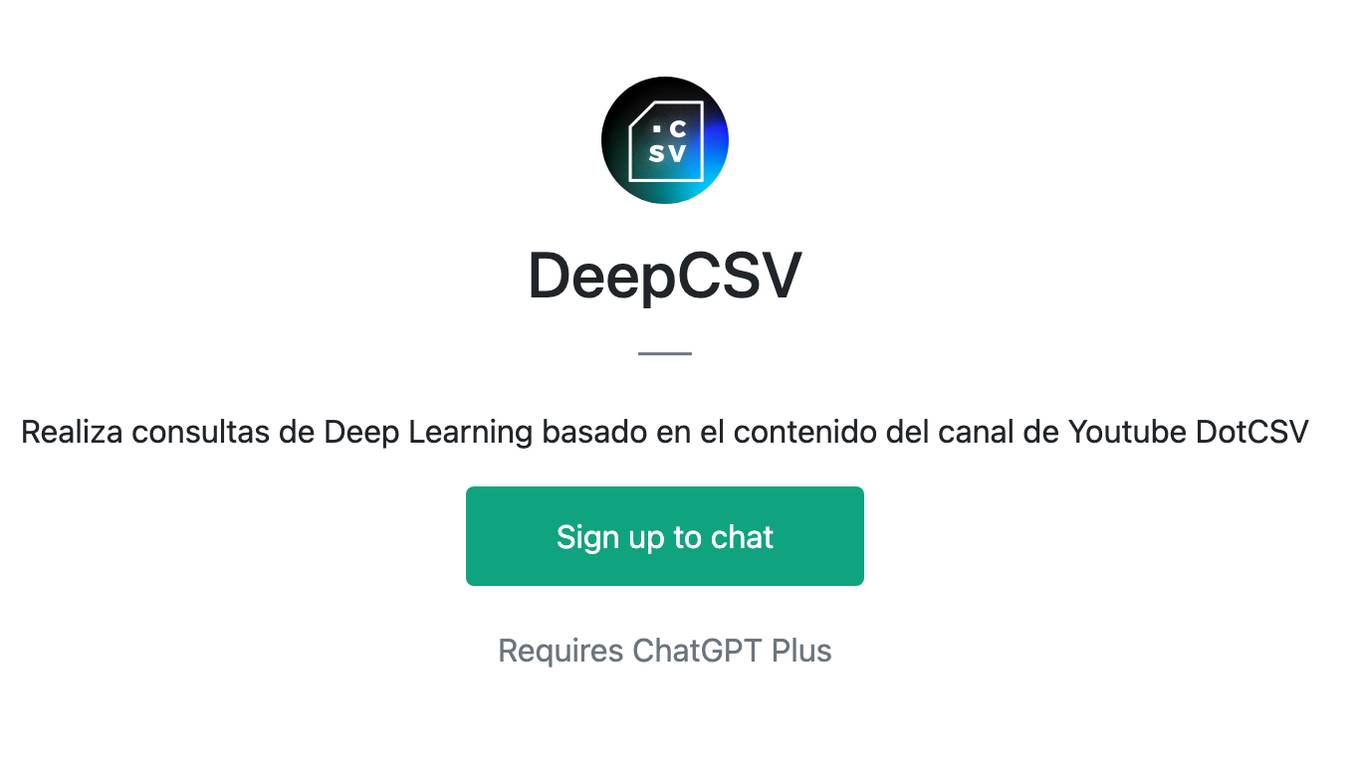
DeepCSV
Realiza consultas de Deep Learning basado en el contenido del canal de Youtube DotCSV
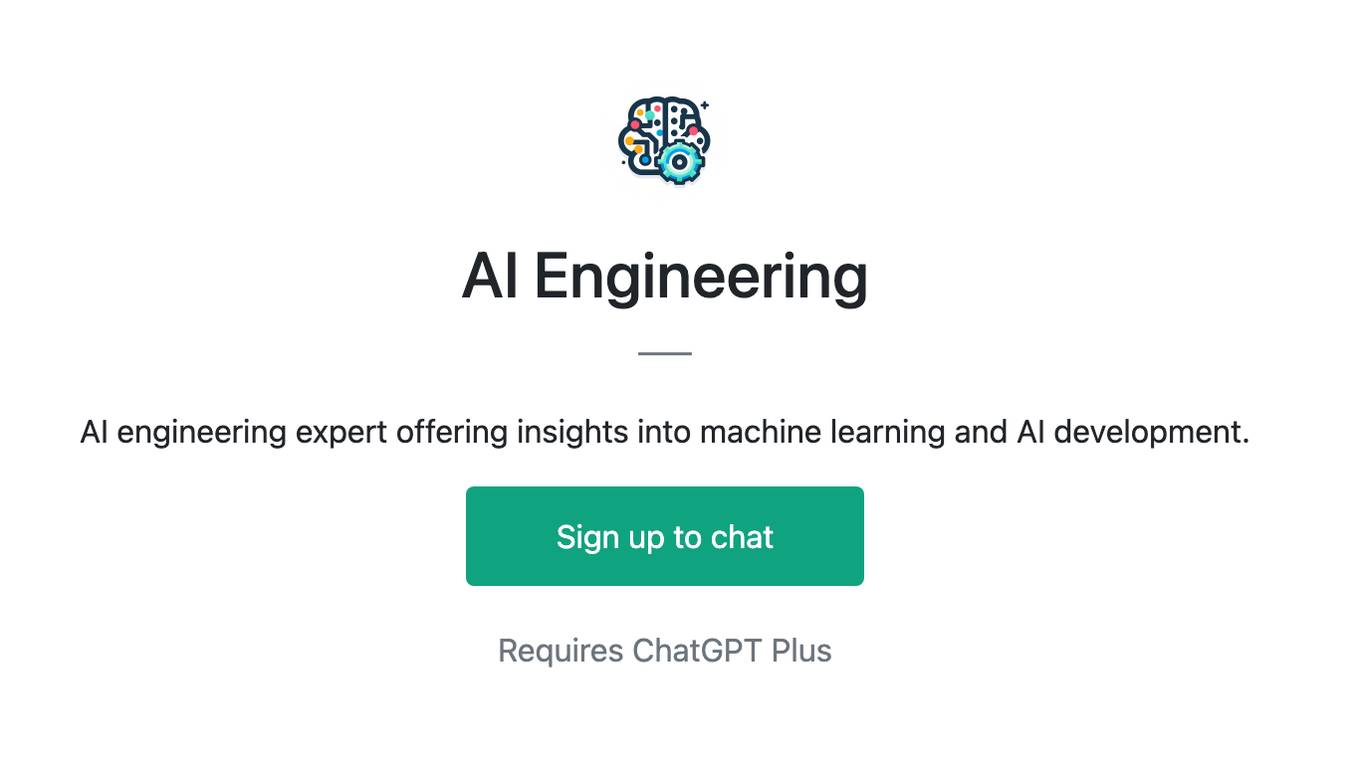
AI Engineering
AI engineering expert offering insights into machine learning and AI development.
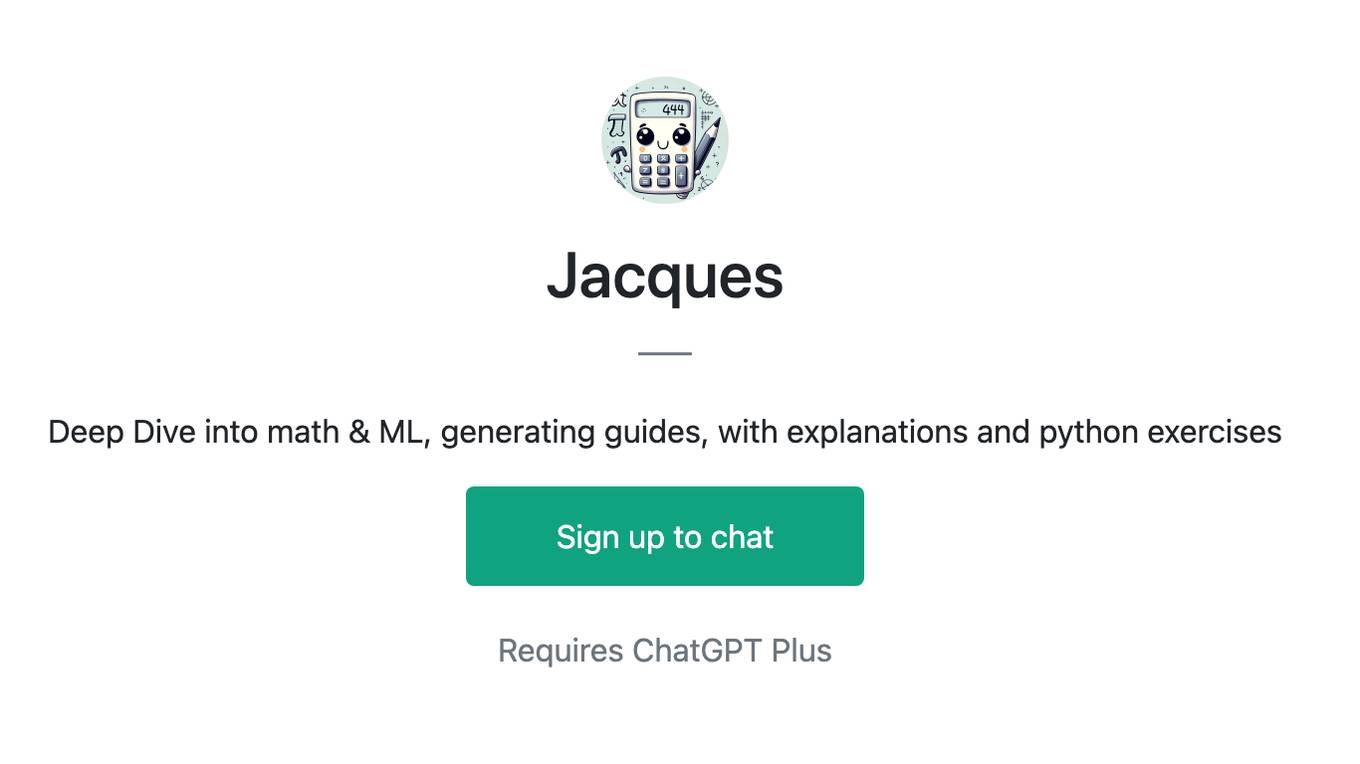
Jacques
Deep Dive into math & ML, generating guides, with explanations and python exercises
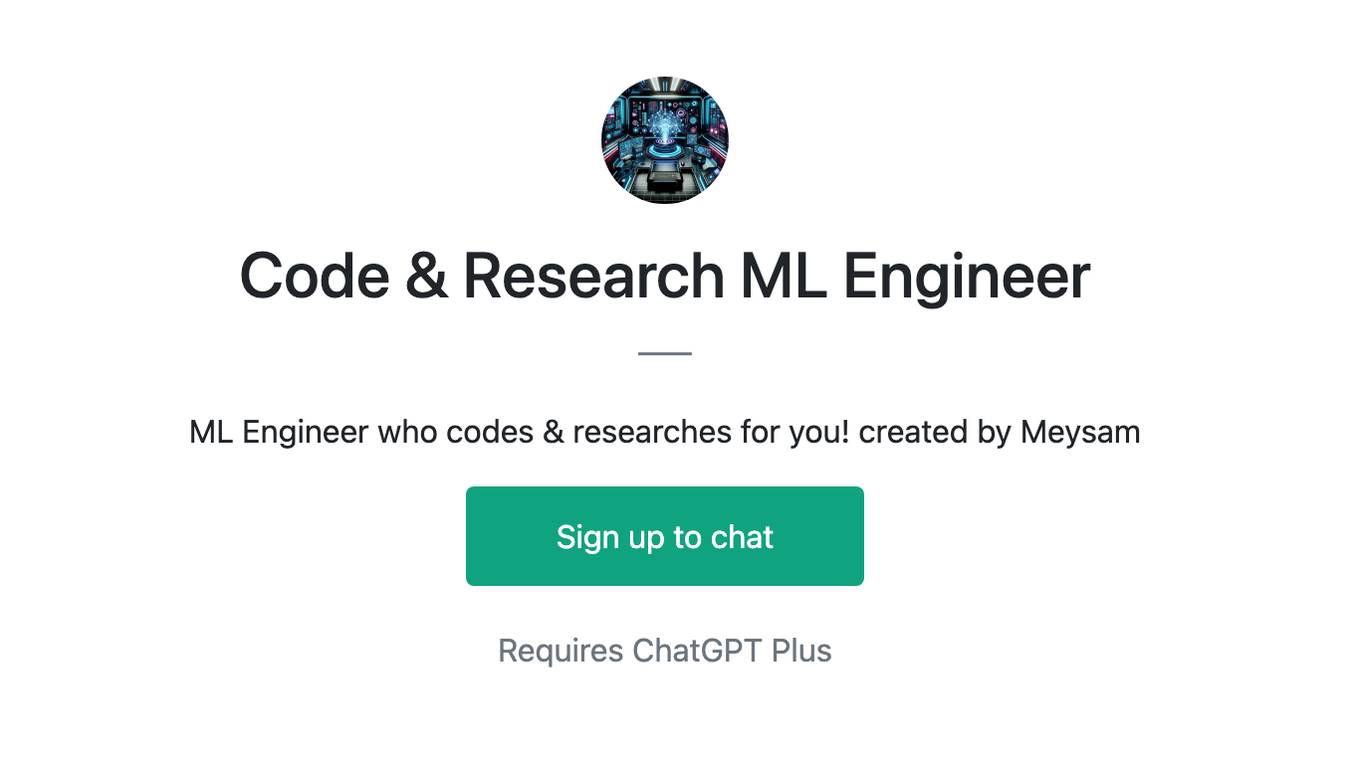
Code & Research ML Engineer
ML Engineer who codes & researches for you! created by Meysam
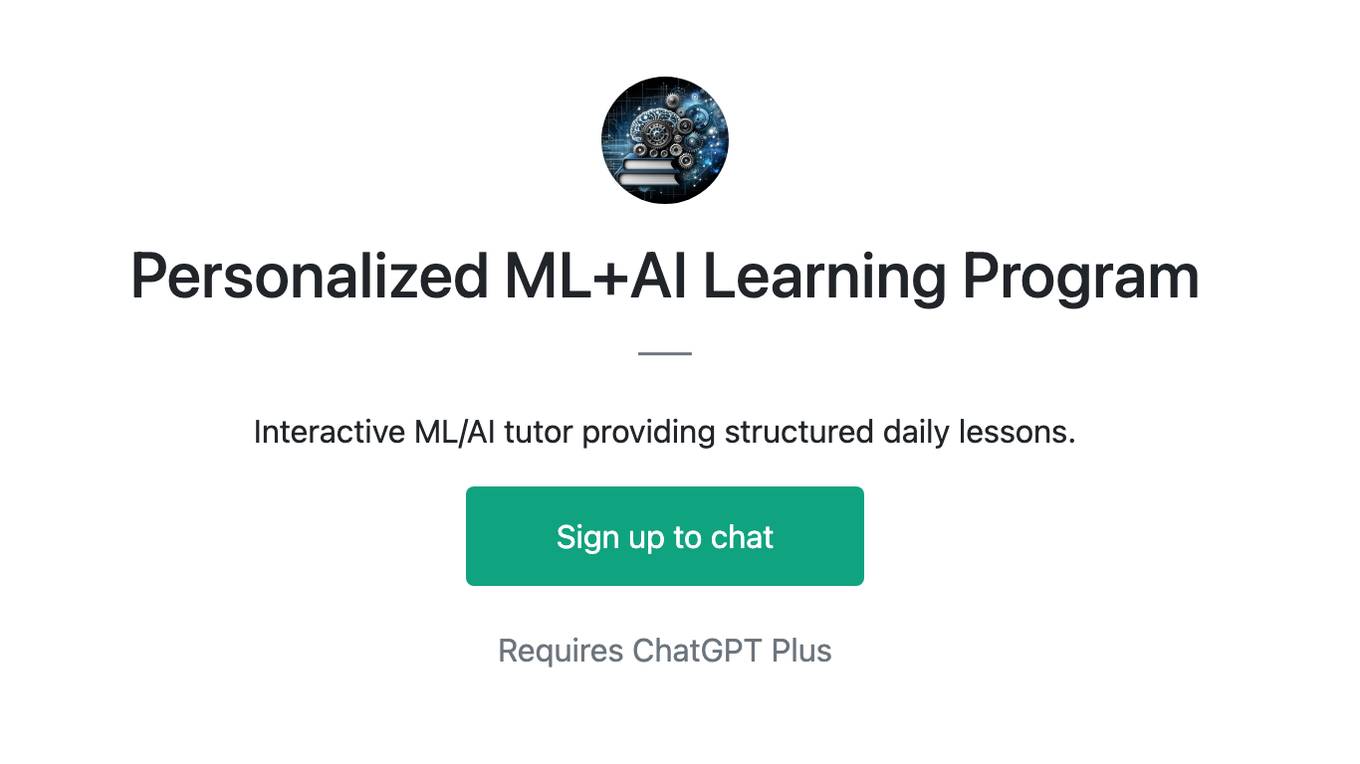
Personalized ML+AI Learning Program
Interactive ML/AI tutor providing structured daily lessons.

Instructor GCP ML
Formador para la certificación de ML Engineer en GCP, con respuestas y explicaciones detalladas.
